#I don’t think the movies over emphasized the violence and war
Text
Anytime anyone used to say how the lord of the rings movies were too violent and battle-centric I always thought like yeah okay there are some pretty nasty parts for sure and I hadn’t read the books myself then so I couldn’t really argue but now that I’m actually reading the books I’m honestly surprised to see that a lot of the violence and horror that I had just assumed were added in to the movies for shock value and drama are things that are straight from the text. Like the Uruk hai head on a spike in two towers or the catapults shooting the men’s heads who had fallen at osgiliath over the walls of minas tirith…….that shit is fucked
#lotr#lord of the rings#tolkien#the two towers#return of the king#I don’t think the movies over emphasized the violence and war#things just take a different amount of time visually vs written#in the movies it’s not like they can spend the same amount of time focussing on like shrubs the way tolkien does in the books#and vice versa it takes more time to show a fight or battle than like ‘they fought long and hard’ yknow#different mediums#I’m even more impressed with the movies now that I’ve read the books#or I’m reading them anyway#I’m literally at the part with the catapulting of the heads in rotk right now
27 notes
·
View notes
Text
ETERNALS SPOILER REVIEW
Seriously SPOILERS, be warned!
So I watched Externals last night and I really liked it!! I think it’s a very solid movie that feels like it fits into the MCU while also retaining a distinct identity.
The low Rotten Tomatoes critic score has been the subject of a lot of discourse around the movie (the critic score sirs at 49% while the audience score is 86% positive right now) and although I agree that the diversity of this movie and the … lack of diversity let’s say in the general reviewer population may play a role in that, I wonder if maybe the fact that this is a “higher concept Marvel movie” might also be contributing to this.
This isn’t me calling the rest of the Marvel movies dumb, not at all, or saying they didn’t deal with mature themes. But Eternals is basically “the Space Trolley Problem” and I wonder if that moral ambiguity isn’t reading well with some.
I frankly think it’s the movies strength; when the team finds out that their mission (to protect the planet Earth and it’s people from the deviants) was actually for the purpose of allowing the population to grow to the point where a new Celestial can “emerge from the energy the planet now contains” (and in turn destroy the planet and all the people on it but create possibly thousands of new worlds by this birth) they’re truly divided on this, and I REALLY like this.
Don’t get me wrong Civil War did this division as well, but Team Cap be Team Iron Man never felt as morally ambiguous (don’t give the power of superheroes to Thaddeus Ross you dumbass). The belief that the loss of one planet and its people is worth the opportunity to create thousands more isn’t a “bad guy” belief, and I think the movie explores this tension well. Ikarus’ actions he does because of this belief are wrong, but his belief in it itself aren’t, which is emphasized by Kingo agreeing (but pledging non violence), and best by Xersi, who despite being the leader of the “save humans” movement is HORRIFIED by the idea she’d have to kill the Celestial. Her initial plan isn’t to stop the emergence but delay it - to save the people of earth and relocate them but to allow the Celestial to be born - because she too feels that there is good for the universe in the creation of the new Celestial, even while she opposes the METHOD. That nuance is great and I think it really sells the main conflict in a very personal way.
The motivations of the main cast are all really well fleshed out, despite being so many of them. Ajak’s evolution from leader of destruction to finding the humanity in herself constrained with Ikarus’ actions how knowing of the true end of earth and having to lie to his wife eroded that relationship and his faith in “the plan” are a great twist and very well juxtaposed. Thena’s struggle against her memories and regaining herself and Gilgamesh’s devotion to her are very poignant and heartfelt. Druigg’s helplessness at watching the violence of humans knowing he could stop it and then his actions in controlling his village and how it shapes his anger towards the Celestials feels fitting, as does Phastos’ grief at the evolution of the technology he created being used for destruction and the joy he finds in his husband and son. And Sprite’s anger and isolation and envy of being alone even in her group of Eternals - the only child in appearance, unable to ever evolve to live the life the rest can - makes her ending allegiance totally natural.
I’ve also seen criticism that the “story was all over the place,” which I’d also disagree; it’s not a linear story but it’s pretty easy to follow, and every flash back serves a narrative point.
That’s not to say it’s not without it’s faults: the resolution to the Deviants feels fitting in terms of Thena avenging Gilgamesh and remembering who she is, but it’s slightly anti-climatic given the newfound sentience of the Deviants and their leaders resentment towards the Celestials. Dane barely gets any storytime, which I understand narratively but which is a shame as Kit Harrington is quite good and I think Dane would have also served as another great human foil throughout the story. Some of the exposition is a little bit too “here’s how the story works guys” and the symbolism is occasionally a little on the nose (like Ikarus dies (right after doing the Synder Superman pose) by FLYING TOO CLOSE TO THE SUN).
Overall though, I really enjoyed Eternals! I definitely recommend it to anyone who loves the MCU films!
#eternals#marvel mcu#marvel cinematic universe#marvel#kit harington#richard madden#Jemma Cham#angelina jolie#movie review#marvel eternals#eternals spoilers#spoilers
16 notes
·
View notes
Text
Let’s Go Steal a Yacht
[UPDATED 2021.] Written for the 2020 @rtwritingcommunity‘s Secret Sunshine event for @leftsmitteninbritain! Just edited for 2021. Safe now! Please enjoy some unrestrained summer fun on this lovely August eve!
AO3: https://archiveofourown.org/works/25569448
--
The sun over the Los Santos skyline was relentless. The heat this week hadn’t been less than 90 degrees and it scorched every citizen that walked down the roads, turning skin red and blistering and making everyone sweat. Like every smart citizen of Los Santos, the Fake AH Crew had been mainly squirreled away inside their frozen fridge of a penthouse apartment, air conditioning blasting.
But Geoff’s birthday was coming up and that required a big bash. Michael bent over the proposed plans, scrunching his nose up as he pointed at the phone where they had all scribbled down ideas.
So far, the list was pitiful. “We can’t go out to bevs, J,” Michael sighs. “He doesn’t drink anymore. That’d be weird, right?”
“Only as weird as you make it,” he shrugs, glancing to Gavin, Jack, Trevor, and Alfredo who were sitting lazily on the various penthouse couches, watching with various degrees of boredom. Geoff was out on an errand — they should have at least half an hour of uninterrupted time to discuss.
“What if we did like — a heist?” Jack asks, snatching the phone from Michael. Gavin just grins at his immediate pout, but Michael hands the phone over anyways. “Like, combine something fun with a little mayhem.”
“Geoff does love his mayhem,” Gavin nods. “What do you have in mind?”
“There’s a bunch of rich kids who are running a coke scam across the border out of their yacht,” Jack explains, gesturing to the map of the city and pointing at a spot on the Los Santos waterfront. “It’s a pretty low-bit operation. Not much drugs, but it’s sort of just an excuse for the Harvard whiz-kids to blow off some steam. But they do it off of a massive yacht. I’m talking three-floors, two hot tubs, helipad sort of shit. Mommy and Daddy must own it, but the kids run it.” She grins up at them. “Seems like the sort of thing Geoff’ll like, right?”
“So… you’re thinking that we make a run for the yacht, take it and the drugs, and then have a full-out bev party with their built in pool?” Gavin’s all smirks, sitting back and putting his feet up on the table.
“Not to be a downer or anything,” Trevor says smoothly, “but won’t killing the sons and daughters of some filthy rich people like — cause more problems than a few pounds of coke and a boat we could buy is worth?”
Jack shakes her head. “I know these types of kids. I’ve been scouting out the yacht on my morning flights. It’s not stocked for a fight. I think the kids know it’s a matter of time before one drug lord or another rolls them over for their stock. It’s not meant to be a long-term operation. It’s not like they need the money. I figure, load up on some guns, be intimidating, blare a megaphone from my attack chopper, and they’ll roll right over.”
“Give Geoff a fun day out without any actual violence,” Jeremy hums. “I’d like to actually shoot at someone, but it’d be fun to pretend, anyways.”
Jack chuckles a bit. “Can you live without blood and guts for one day, Rimmy?”
He huffs out an overexaggerated sigh, but then laughs. “Yeah. For Geoff.”
“For Geoff,” they agree. And the plan is set.
—
A few days later, on the day of the fight, Michael meets Gavin in the door of their shared bedroom. He leans against the doorframe, watching as the other gathers some of his camera equipment and places it in a waterproof bag. “So,” he purrs, announcing his presence. “Does that mean I get to see you in a skimpy bathing suit?”
Gavin doesn’t even have the decency to jump. But he does smile, moving over to the man as Michael shuts the door soundlessly behind him. “Guess it does. I’m sure you’ll like the view,” he grins back mercilessly.
“Don’t be an ass,” Michael teases, grinning with sharp teeth as he runs a finger down Gavin’s skin. Already tanned and lovely, Gavin really didn’t need much more sun. But his lips were still warm as he leans over to brush a kiss against Michael’s.
That wasn’t going to fly, and Michael shamelessly yanks him forward for a breathless kiss that leaves them both chuckling as they break apart. “And there’s more where that comes from later,” Michael demands as they step back. “I want no less than half an hour of uninterrupted Gavin time on a beach chair.”
Gavin laughs, eyes bright. “Is that so?”
“I want a frozen drink in one hand and my boyfriend’s hair in the other,” he says brazenly, laughing openly. “Is that too much to ask?”
“Sounds great,” Gavin smirks, eyes dancing, giving him one more kiss on the cheek. “Now get out. I’m sure more things need to happen and Alfredo’s going to need three people to tell him he shouldn’t bring a sniper rifle to a yacht.”
“Bet you fifteen bucks Jeremy is going to throw him into the pool and by the end of the night, neither of them are going to be able to stand.”
“Fifteen bucks. Jeremy can stand. We’ll have to fish a passed out Fredo from the pool.”
“You’re on.”
—
The best thing is that Geoff has absolutely no idea that half their heist prep bags are filled with birthday decorations, swim trunks, food and drink mixes, and all sorts of other goodies. He’s all gung-ho with the idea of shaking another drug gang from their territory and as far as the birthday boy is concerned, they’re going in loud and will return home for dinner and a movie.
They take a speedboat and a few jet skis out to the yacht, moored about a mile off shore in the deeper waters. As soon as they get close, they can hear shouting echoing over the waves. Probably emphasized by the whop-whopping sound of Jack’s blades overhead as she hovers in her copter.
“You have ten minutes to fully vacate this vessel!” Jack shouts. Only her boys can hear the glee in her voice as it echos, amplified by the speakers she has attached to the helicopter. The yacht erupts in chaos, scantily clad men and women racing around. Through the scope of his sniper, Alfredo can see drinks and things being tossed overboard.
“Leave the drugs and we’ll let you go,” Jack continues to order as people continue to scream and race around. Jeremy and Michael drive their jet skis in circles around the yacht, their screams of laughter erupting as shots pock the water around them. They’re going much too fast to be hit by an untrained hand.
“Should I take the shot?” Fredo asks lazily, gun in his hand. He doesn’t expect to receive a yes, and he’s right, Geoff waves his hand, just chuckling. It’s cooler out on the water, and if he spends his birthday just chilling and watching a bunch of rich bitches freak out, that’s fine with him. “Let ‘em squirm.”
After five or so minutes, they start to board the yacht. Any stragglers who try to fight them are immediately knocked out. There’s no need to kill, not in this adventure — that would bring down more trouble than it was worth. With any luck, the kids will tell this story to their friends back at their hoitey-toitey universities and no one will have to die.
Michael joins up with Jeremy as they’re wandering around the main deck. Jeremy has his obnoxious yellow ‘Bigness’ mask over the second part of his face and Michael has paint drawn like war lines across his face in a pattern he’s affectionately named ‘Mogar’. Lingering twenty-something’s spook as they see them, racing away.
At the end of the day, Jeremy only has to throw one sod overboard. He screams as he falls the six-something feet over the back deck, hitting the water with a thwap that seems painful. Michael screams jeers after him, Jeremy laughing warmly with pleasure.
They watch as the guy swims frantically towards the circling speedboat of rich kids, who pull him on board and race away.
“Did you see that idiot?” Michael laughs, spinning Jeremy around and removing that god awful cowboy hat. “He almost pissed himself when you grabbed him.”
“Rumors of the Rimmy Tim go a long way,” Jeremy cackles. “I wasn’t even carrying my gun.”
“You’re a god awful eyesore, J,” Gavin’s voice filters through their coms. “I’ve disabled any tracking they have in the helm, plus gps positioning. Stand by, gents — this party is just getting started!”
Geoff, standing at the bow on the top deck, lazily wraps his arm around Jack and grins. “A very merry birthday to me,” he hums. “How much coke did we salvage?”
“About $50 grand worth, I’d say,” Jeremy says from the lower decks. “Not bad for an hour and no bullets.”
“Damn,” Geoff smirks. “I love to be King.” He runs his hand over the rail of the yacht. “Alright boys, let’s scuttle this thing and head home.”
“Scuttle?” Alfredo bursts, incredulous. “No, no. Everyone gather at the hot tub in the rear of the boat — ”
“Aft, Fredy!” Gavin protests. “Gotta be sea-worthy!”
Alfredo sighs and Trevor just kisses him on the cheek with a smirk. “I’ll throw him into the sea myself,” he whispers in his ear.
“....aft, then. Jack wants to say something.”
“Something you can’t say over coms?” Geoff asks with a raised eyebrow, but at Jack’s bright grin of insistence as she pulls on his arm, he laughs and shakes his head. “Okay, I’m coming, I’m coming. But you better get this out past the twelve-mile marker soon or we’re going to have the LSPD on our asses.”
“Pulling out,” Gavin hums. “This thing is run entirely on auto-pilot. Auto-ship? What’s the correct word? Anyways, I’m steering it out now.”
Even as he says it, the ship starts turning and heading out towards the open waters. They all rock a bit, but quickly find their sea legs as they head towards the aft, where Jeremy is already pulling off his heist clothes to reveal yet another glaringly purple-and-orange outfit — this time a pair of swim trunks — and falling into the hot tub.
It’s sickeningly hot, but it doesn’t stop him from wanting to take advantage of the bubbles.
It doesn’t take long for them to arrive, Gavin poking at his phone to make sure they’re not going to crash into, like, an underwater bomb or something. Geoff glances around at all of them, specifically at Jeremy with swim trunks, and lets out a bit of a sigh. He can’t help but grin. “Guys…”
“Happy birthday, Geoff,” Jack smirks from off to his left, pulling out something from her bag. It’s a firecracker, and with a tug, confetti and sparks fly out over the deck. “We’ve got snacks! Diet Coke! Party favors! And best of all…”
Michael moves over and, waving his arms in an elaborate parody, tries to encompass the entirety of the yacht they just stole. “A yacht, just for you!”
The others erupt into cheers as Geoff turns a bright red. Redder even than the sunburn that already marked his cheeks, anyways. “Boys, you didn’t have —”
“Stop,” Jack teases, shaking her head. “You know we did.” She squeezes his arm and pushes him towards the hot tub. “Now, relax.”
—
Two hours later, Geoff had discovered the massive built-in grill and was working on preparing his own birthday feast. They had protested, telling him this was his day, but he was having a blast. Gavin had hacked into the speakers and music was pumping. Currently, Jeremy and Jack were racing each other on jet skis around the yacht, screaming and yelling at one another as they zipped past with incredible speed.
Michael was focused on a different sight — namely, Gavin’s face as he leaned over him as they both sipped on fruity, icy drinks. The booze was sliding through their veins, making the world a looser, happier place, even if Trevor kept prompting him to drink water to keep him from burning in the sun. Their hair was both wet from their journey into the water, but now they were just relaxing in the warmth.
“You’re tanning,” Gavin teases, nosing into the side of his face and kissing his ear just a bit. Michael just laughs. “I’m fuckin’ from Jersey, man, what do you expect.” Gavin’s resulting musical chuckle makes him blush a bit.
“Whores,” Alfredo comments dryly as he strolls past, but his grin shows he’s only teasing. He’s got some fruit concoction in one hand and was making beeline towards where Trevor was waiting for him on another deck chair. Everyone knew he couldn’t resist making a playful comment, but it doesn’t matter. Michael was feeling real good, and teasing wasn’t going to stand.
He lurches up, dumping Gavin unceremoniously from his lap. “What did you say, you ass?” he calls, stumbling after Alfredo, who bursts out into laughter and flees to the dock. Gavin sits up and throws something at Geoff, who turns from the grill with amusement.
“Catch me if you can, bastard!” Alfredo laughs, dodging his attempts at capture with dexterity that no one should be capable of with so much booze inside him. But Michael has the dogged persistence of a man who loved to cause chaos, and it’s not long before he’s captured Alfredo in a tackle hold that sends the other squirming.
“God!” Michael grumbles, “You’re disgusting, you ass, so fucking sweaty! Have you gone swimming yet?”
“No!” Alfredo shouts, struggling, and they grapple for a few moments, laughing, before they lurch towards the edge of the dock.
No amount of struggling and playful yelling could stop this — Michael chunks Alfredo unceremoniously over the side of the dock. He spirals, arms and legs akimbo, until he splashes into the warm water of the Pacific with a yelp.
Everyone on board erupts into laughter as he surfaces, sputtering out insults and making sure he didn’t get water up his nose.
“Dick,” Alfredo mutters as he climbs back on deck, sprawling into the sun as soon as he lands there, spitting out water. Michael leans over him with a playful grin. “Don’t call me a whore again,” he says with his roguish grin and returns to Gavin’s waiting arms, who was giggling the whole time.
—
It’s truly insane just how much booze they get through, even if Geoff isn’t imbibing. The day trails on with a mixture of swimming adventures — Jack finds a few sets of snorkels in one of the unfortunate college student’s stuff — and launches into teaching a few very drunk boys the wonders of fish and coral. They are pretty decent swimmers even with a few bottles of booze inside them and only once does a rescue need to be made for Gavin, who is rapidly losing his ability to stand.
Geoff serves them an elaborate feast of steak, burgers, and dogs, supplemented with potato chips, potato salad, and regular salad. A true barbeque, and they eat like animals, ripping into it all.
Jeremy finds himself leaning against Jack at one point in the meal, and she gently puts more water in front of him and kisses him on the top of the head. She’s feeling good herself, nowhere near losing control but enough to be a bit more free with her affection.
She loves these idiots from the bottom of her heart. It warms her even more than the sun to see Geoff smiling so brightly, Gavin and him laughing about something foolish, Jeremy and Michael holding hands even as Michael tosses bits of bun at Alfredo to catch in his mouth, Trevor kissing him on the cheek every time he manages to catch one. Even if Trevor and Alfredo were their own little couple, they were family. They were her family.
Michael catches her smile and returns it. He looks tanner now, sunburn catching the tip of his ears and the curve of his shoulders, but it’s just great to see him so relaxed and happy.
They needed this. Summer just meant shorter nights which pushed for more intense heists with a shorter getaway period. She knew more than anyone the lengths to which they were working to be better, better, better. Geoff had said it themselves — they were Kings of Los Santos, but at what cost?
But today, it was a break from that. It was time for sun and surf, for snorkeling and barbeque dinners, for unrestrained booze (within reason, of course) and even less restrained smiles.
Her family. Criminals all, but criminals who lived and loved same as anyone.
—
As the sun sent cascading beams of color across the sky, Geoff rolls his shoulders and grins from where he was enjoying reading his book without assholes interrupting him every ten minutes. “This yacht is the best fuckin’ birthday present a guy could ask for. Better than dicks.”
“What could be better than dicks?” Michael teases from where he was trying to see if he could balance on a surfboard in a handstand. Gavin’s request. Sometimes he wonders why he gets himself into this mess.
He drops into the water with a crash when a very sunburned Gavin turns to him. “Geoffrey, you’re going to miss the best part!”
“Best part?” He blinks, putting his book down a bit. “What do you mean? There’s more?”
Jeremy’s all grins. “Yeah. Fireworks.”
Of course there are fireworks. And not just any fireworks. Big ones, ones that are illegal all across the county and into California and beyond. Ones that could set forest fires. But for guys who play with real explosives, these are nothing.
He’s just about to ask where they are when Jack comes strolling back over to them, her Hawaiian shirt tied across her bikini top. He has to practically force himself to listen to her instead of losing himself in how pretty she is.
“I’ve rigged them,” she grins, shooting the Lads two enthusiastic thumbs up. “Alfredo helped.” His diabolical laugh when he comes out from behind them and how bright Alfredo’s eyes are is never a good sign for anyone’s safety.
“If anyone knows anything about rigging about thirty wires together in one long fuse, it’s Fredo,” Trevor teases from his place on the deck. Alfredo refuses to look ashamed, just grins like a loon. “Gonna be a hell of a show. Short, though.”
Geoff rolls his eyes, but they can see the smirk he tries to hide. “Okay, assholes, get going then. I’m not going to miss the giant fireworks show on my birthday.” The other Lads race over, following the Gents as best they can when they’re all pretty shit-faced. Michael and Jeremy need to hold onto each other, giggling as they try not to fall down, but with the help of one another they climb the stairs to the top deck and look across the way. There’s a bunch of rockets — nearly literal rockets, not fireworks — strapped to the roof of the rooftop deck across the ship, a good 100 meters away.
“Here goes nothing,” Alfredo says once everyone is assembled and looking up into the beautiful night sky. He slams his hand down on the button and watches as the fireworks erupt up into the sky, exploding in a burst of color and sound.
It’s not the most professional fireworks show. It’s loud and hot and they have to dodge a bit of flaming debris. Michael is literally whooping, jumping up and down, grabbing Jeremy’s arm. Gavin squawks, diving behind Geoff and watching with wide eyes as the leader of the Fake AH Crew watches the sheer destructive force his boys put together, just for him.
“That was awesome, boys,” he grins as it finally settles down. “Good as dicks.” The night air grows quiet and they’re left, just them, the ocean, and the sizzling debris in the water. Smiling at one another, sunburnt and heat exhausted and drunk and looking towards bed, they start turning as one towards the stairs.
98 notes
·
View notes
Text
UNDERSTANDING THE REAL ALIENS OF LUCIFER’S REBELLION.
youtube
Tomorrow morning when you wake up, aliens are lurking around ready to attack.
(All right, let’s get the wrong going right from the start).
Our demonic enemies — are more lethal than any terrorist, or any murderer, or hardened criminal and they’ll be waiting for you. They have flaming arrows. That God says are ready to watch for the exact moment to shoot at you a fiery missile right into your mind. Are you ready to deflect that missile?
The purpose of the Devil’s missiles (and aggrandizement for fear manipulation purposes) John says is to cause believers to forsake their trust in God. It simply isn’t the truth, there are a number of reasons the Devil is attacking you. And within these attacks, there are variables in degree. They are; he wants to manipulate you to run to God. Or to get you to believe in extraterrestrial. He’s attacking to kill you or have you kill (one of his favorites, two birds) or destroy you in some other way and feed his contempt for you. The manipulation of an event or manipulate you to be a shoe salesman so you can tell Fred your story. One thing to note depending on the situation and need, it may not necessarily be the devil that is doing the communicating.
Flaming arrow another aggrandizement. In the man’s defense, he doesn’t know what he’s doing! He’s trying to emphasize the power attributes of the Devil. This brings me to the real reason the Devil and Christ motivated this gentleman to make this video.
The power of the Devil and the Demonic Fallen Angels. He says this is what our lesson is about, and indeed it is.

I had to laugh at this poor enthralled mutton and his marker! Dr. John says My dry erase wide tip marker is Lucifer. Lucifer was created at the hands of God, and like all the rest of creation, God’s holding him. So that’s the fall of Satan, that’s where evil comes from, that’s where all the problems came from. It was when God removed his hold God let go of holding him. That’s the fall of Satan that’s where evil came from. That’s where all the problems came from it was God who removed his hold. God let go of holding him that’s the fall of Satan that’s where evil came from that’s where all the problems came from it was God removed his hold created at the hands of God and like all the rest of creation God holds it together you know what it says all things were made by him and by him all things consist literally hold together if God doesn’t hold something it goes like this Lucifer just fell out of my hand he’s Satan now down there on the floor let me get him.
Lucifer’s Rebellion they are Satan’s demons and they’re part of this Cosmic war against God they’re the supernatural super-powerful creatures.
The attacks on humans are led by the Serpent Dragon his named the Devil & Satan. He is a person he has a single focus as the Adversary of God. He was formerly Lucifer the most brilliant and powerful of all God’s created angels. Now as Satan, he leads the hosts of darkness in their relentless attacks.
All the scientific science fiction movies are about these creatures with glowing eyes with powers that they have those are angels and the Fallen Angels the demons are what we would call the extraterrestrials the UFOs They are the demon, so there are all kinds of activity in the universe the real aliens that fill this universe and that all of our science fiction movies that everybody immerses himself in her about our products of Lucifer’s Rebellion they are Satan’s demons and their part of this Cosmic war against God they’re the supernatural super-powerful creatures.
Now he’s the highest created being he’s the most powerful creative being he is the smartest created being. He was the most honored of all created beings ever. He was the top of all God’s creation until he fell. But he knows he can’t be greater than God.
God! What’s happening to the people with sin is a very important thing. People die, diseases ruled the world. God, Omni Himself, wouldn’t be, you would think, a fluffy puffs kind of guy when it came to the serious stuff! But old Omni Mr. Love He’s got to pause for the cause and tell you what a beautiful guy the devil is. Because this is really important to know! And another thing that’s important to know is how he was so adorned in the most precious of jewels. And Powerful, powerfully strong, almost as strong as God himself. Then he turns his attention to the Angels explains how their powerful evil, demonic and merciless! Now you could argue that it’s important to know how powerful the Devil and the Fallen Angels are. But when you can just wave a hand and say magic words and make them run home. How important could it really be? It would be, in actuality not important at all. But yet this man and many others are constantly drilling, this point home why? The religious don’t know why they just know it’s in the book. God, said it so it must be important, so they repeat it. But this gentleman is saying it so you’ll be scared. And run to God and cover yourself in all the armament of his words. To this gentleman, this is an honorable endeavor. And he has dedicated his life to bring the knowledge to as many in the world as you can.
There is a cunning deception here that you just cannot see.
All of this about the Devil’s power the Angels powers these are all ploy this is all manipulation the religious the Christian, Muslim, Jew, Hindu, etc, can only see this from a religious perspective. But the Devil, Christ, and the rest of the betrayers are not confined to simply the Christian Doctrine. This is that main vehicle of attack! But they will cooperate with all religions in deceptive manipulation. All of this preaching conditioning it’s for an elaborate manipulative hoax! The power of the Devil, the power of the Angels, this critical need to know information is solely for a plane that will be heinously executed.
The Bible was written over 1,600 years by 40 different authors? Bits and pieces And that’s how they feed it to you in bits and pieces but that’s not the only place it’s in the music you listen to it’s in the movies you watch the holidays you celebrate
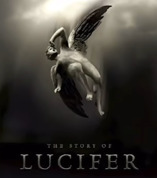
God just let go and if you ever want to know where the origin of evil and how you know all this started and how the whole universe started falling apart think of my marker falling on the floor (Sometimes you got to laugh).But wait there’s another philosophy in the land of Gods. Religious Jewish people say that’s all a bunch of nonsense and they’ll have none of it! They claim they have pages and pages and books of their own nonsense.
The only thing these two guys have in common is that God’s a scummy fella who is causing all of this, by holding it all together.
According to the rabbi, your no good, your no good, baby your no good!
youtube
WHO IS SATAN? He is not who you think he is. The Jewish and Christian concepts of Satan are extreme opposites.
According to this gentleman, God’s a pretty sick fellow but it’s okay because it’ll make us all mentally better! He is explaining their religious teachings their religions believe It seems they believe that we had to be brought down to the very foundations of repugnance to the point. Where will commit acts of violence that leave People face down in the dirt dead! Because if we popped up later on and mental evolutionary timeline we wouldn’t appreciate the absolute decorousness of a pretty dining room set?
Hey you, what do you see?
Something beautiful or something free?
Hey, you, are you trying to be mean?
If you live with apes man, it’s hard to be clean.
The beautiful people.https://www.youtube.com/watch?v=Ypkv0HeUvTc The beautiful people.
Ok, I’m going to spell it out you should have been able to figure it out really on your own. They believe in the right of what they’re doing. This mindset is what has compelled the growth of religion in all walks of faith. This is one of their most effective manipulative dangerous weapons in the Devil and Christ’s arsenal and they welded it with skilled precision!
Rabbi Mic; Four times more crap does not qualify as twice the truth! I form the light, and create darkness: I make peace, and create evil: I the Lord do all these things. Yeah, this was written down because we have a creep that’s been manipulating everything. God did it. It says so right here in the book! It was put there clearly put there purposely by Christ and the betrayers. And by a Being that tells you, he’s God and to kneel to him and beg for forgiveness and your life! Snap out of it for crying out loud you freaking bookworm zealots and look the frig around once in a while. Christ and the betrayers have written a lot of different religions. This is all part of their Smokescreen of confusion and manipulation. The main vehicle of attack is the Catholic Christian religion. This is the one they have the most psychological pull with. They have spent thousands of years. Gone through numerous populations and religions to isolate this deceptive and manipulative power. This is not only in the Christian Muslim and Jewish religious books the cunning manipulation is in all religious writings immense amount of literature music and all other branches of entertainment.
Rabbi Mic says; That there’s not one passage in the Christian Bible, not one passage that shows that the Devil is subservient to God, not one passage in the New Testament showing that the Devil is subservient to God. Religion like so much else is a lie! What we are living in is an elaborate fabrication and elaborate deception of incomprehensible magnitude the individuals are real the characters are fiction as are all contributing Literature. We haven’t been brought down to the dregs of existence just so you can hopefully learn to clean up after you shave and go to work. This is design for multiple purposes one of the biggest mistakes the enthralled religious make is in the absolute belief in the narrow religious teachings. The Devil and Christ and the rest of the compromised betrayers are under no such constraints.
Both of these religious teachers are absolutely convinced within their religions. They’ve studied it intensely examine each other’s books. Both religions are convinced God controls all the good and evil. Neither is able to come to the understanding that they’re both being manipulated by the same group.
All perceptions are misconceptions.
Ape-man — God †★† Christ — Shiva †★† Islam, Judaism, Christianity — Extraterrestrials. Are all designed they are all in place for a division of controversy. No single prevailing thought can hold absolute acceptance this is all a strategical maneuvering. With the Devil and Christ prevailing with God in absolutes. With enthralled worshipers that are going to be used in the most heinous act of manipulated hate. And the world will be consumed in an all-consuming fire and no one will be saved.
#new world order#artificial intelligence#end times#end time prophecy#science#devil#Christ#Anti God#Religion#Jesus Christ#Shiva#hinduism#atheism#judaism#islam#fallen angel#space aliens#allah#God
3 notes
·
View notes
Text
Origin Stories 2020
The stories we tell about our past affect the way we view the present and orient toward the future. This is true about the myth of Thanksgiving, stories we tell about Ethical Culture's past, stories we tell about our individual journeys, and more. When we recognize the impact of origin stories, we can be intentional about how we tell them in the future and how they guide us to bring out the best.
This Platform Address was written for the Washington Ethical Society by Lyn Cox, November 29, 2020.
Has anyone seen the movie, Captain Marvel? You know I did. Back when going to movie theatres was a safe thing to do, I saw it in the theater. The nostalgia for the music of the mid-1990’s alone was enough to catch my interest. I don’t want to spoil it for those who are waiting for a quiet evening to watch it at home, so I’ll try to speak in general terms.
The movie opens with an interstellar super soldier named Vers, who is having trouble with memory, but nevertheless goes out on a mission with her team, part of the Kree empire. Throughout the movie, she learns more about where she comes from, and more about the origins of the conflict with the people she thought were her enemies. Once she has come around to a different understanding of who her people are, the personal qualities she has been criticized for are reframed, and she can draw from them as strengths. This revised worldview moves her to an entirely different sense of her mission in life, as well as a different sense of connecting and belonging.
The paradigm shift that the main character goes through in Captain Marvel reminds me of the power of origin stories. The stories we tell ourselves about ourselves--as individuals, communities, and countries--affect how we reach out to others and what we think we’re capable of. As we reflect on this holiday weekend, we’re confronted with one version of the origin story of the United States, the one some of us were presented with as children at this time of year. That version of the story is infused with myths and half-truths, and depends on the erasure of the historical and contemporary perspectives of Native Americans, among other groups of people. Whether we are dismantling the settler-colonial narrative, incorporating new insights into our understanding of ourselves as a community, or finding personal empowerment in reframing our individual origin stories, returning to the stories about beginnings or turning points with open minds can help us reshape our future.
Whether we are speaking individually or collectively, origin stories matter. Events get baked into information we regard as fact, or perhaps legend. Left unexamined, these stories can divide people who need not be divided and disempower people who could be living fruitful, generous lives. It matters how we tell those stories. The inclusion of truths or half-truths, and which facts are emphasized or glossed over has an impact. In communal stories, whose perspective is centered makes a difference.The way we understand the narrative structure of the story is also a choice. The good news is that stories can be reframed, even within the bounds of verifiable facts. Origins are not destinies. We can rearrange the emphasis, lift up silenced voices, and find strengths that had previously been minimized. That’s what we’re talking about today. With regard to both individual and collective narratives, (1) Origin stories matter, (2) the way we tell origins stories matters, and (3) stories can be reframed.
Origin Stories Matter
Earlier, we heard an excerpt from a talk by Emily Esfahani Smith. She has done interviews and followed studies in positive psychology, first asking the question about what makes people happy, then shifting to the question of what helps people live meaningful lives. She said, “Creating a narrative from the events of your life brings clarity. It helps you understand how you became you.”
In her review of the available research (excerpt from her book on the TED talk website), she found that the stories people tell about the pivotal events of their lives can affect how they feel about themselves, their level of confidence or anxiety, and what behaviors they choose in the future as they subconsciously live by their stories. I’d like to add a caveat that not everything in our personal narratives is about perspective or attitude; sometimes a person’s anxiety or adaptive behaviors are shaped by oppression, trauma, or other circumstances. Even so, examining our lives for the agency and resilience that we do have gives us some extra tools and is worth a try.
When you add humans together to tell a collective story about the turning points of a community or a movement or a country, origin stories can have an even wider impact. Last month, I drew from An Indigenous People’s History of the United States by Roxanne Dunbar-Ortiz when we discussed Christopher Columbus. In the introduction to her book, in reference to Thanksgiving, Dunbar-Ortiz wrote:
Origin narratives form the vital core of a people’s unifying identity and of the values that guide them. In the United States, the founding and development of the Anglo-American settler-state involves a narrative about Puritan settlers who had a covenant with God to take the land.
Then, in chapter three, Dunbar-Oritz picks up this thread again:
The United States is not unique among nations in forging an origin myth, but most of its citizens believe it to be exceptional among nation-states, and this exceptionalist ideology has been used to justify appropriation of the continent and then domination of the rest of the world.
In other words, Dunbar-Ortiz credits the mythological version of the Thanksgiving story, a particular version of the origin story of the United States, with fueling some of the worst behaviors of the United States and many of its citizens. A story that was framed to make heroes out of the Pilgrims and inspire patriotism has also inspired exploitation, theft, and violence.
Dunbar-Ortiz is not alone in this observation. James W. Loewen, in Lies My Teacher Told Me: Everything Your American history Textbook Got Wrong, also unpacks the Thanksgiving story as an origin myth with devastating consequences.
Loewen says that, in the cases where the Thanksgiving holiday is observed without examination or critique, “the civil ritual” marginalizes Native Americans. That marginalization comes not only from perspective or emphasis, but from actual falsehoods that are re-told in mythic versions of the story. These false myths serve to reinforce what Loewen calls white “ethnocentrism.” He says that when textbooks promote this version of the story, they diminish the capacity of students to understand the culture they are in or how to relate to each other.
At the time of his original writing, the term white supremacy culture was not as widely in use as it is now, but it is apt in this case. The outdated version of the Thanksgiving story idolized the colonizers and erased the humanity of the Indigenous people they encountered. This is both a manifestation of and fuel for white supremacy culture.
We’re finding that, just as our personal origin stories can lead us to make choices so that we live by those stories, national origin stories guide our future behavior. Origin stories matter.
How We Tell Origin Stories Matters
Now that we’ve established that personal and collective origin stories can have an impact on our self-concept and our future choices, let’s talk about how we tell those stories. We have choices in the perspectives and events we emphasize, and in the shape of the narrative arc.
Earlier, we heard a passage from A People’s History of the United States: 1492-Present by Howard Zinn, in which he draws an analogy between historians and mapmakers. Zinn is more generous toward mapmakers or cartographers than I would be, saying that the choices about what projections to use or what details to include in a map are mainly technical. I think maps are much more political than he implies in this comparison, but the point stands that both historians and cartographers have to make choices in conveying information. It is incumbent upon us to examine our purpose in making those choices, and to think about the impact of those choices. How we tell the story matters.
This is where the collective storytelling and the personal storytelling intersect. As we are figuring out how to tell our personal stories, we’re also trying to figure out how we fit into the larger picture. When we are not truthful in our collective stories, we make this task of fitting into the larger story much more difficult for everyone, especially those who have been marginalized. If we have the privilege and responsibility of telling a collective story, we should try to ensure that all of the people in that story are reflected as their whole selves. Incorporating multiple perspectives into our stories makes it easier for the community and for individuals to understand ourselves and to find meaning and purpose.
My colleague Jone Johnson Lewis from the Riverdale Yonkers Society for Ethical Culture has demonstrated this beautifully in her research about the history and historiography of the Reconstruction era. She notes that narratives of the Civil War and the Reconstruction period that were taught in school for decades do not match the evidence. (Here’s her August 2 Platform Address as a guest at the New York Society.)
Starting in the 1920s, professional historians who were collectively known as the Dunning School were training school teachers to talk about the Civil War as a matter of “states rights,” despite the fact that all of the documents about secession referred to slavery, and the founding of the Confederacy did not allow states to have the right to opt out of slavery. This tradition referred to Reconstruction as a disaster, a burden placed on the South (meaning the white landowners of the South) by opportunistic northerners. The Dunning School presented an egregious misrepresentation of the facts of Reconstruction, and was part of perpetuating the idea that African American people were not capable of self-determination. This view lent support to voter suppression tactics such as literacy tests, and fed racist white resentment that is still an active force in politics today.
The deliberate revisions of the Dunning School were partly the work of David Saville Muzzey. Muzzey was not only a professor of history, but also an Ethical Culture leader. Muzzey wrote a history textbook that was heavily in use from 1927 to 1938, and was source material for textbooks for at least another generation. If we’re going to note the successes of Ethical Culturists throughout history in promoting justice, we also have to examine the ways that Ethical Culturists supported white supremacy culture. By learning from the mistakes of our kindred in the past, we can help prevent ourselves and our successors from repeating them.
According to Jone Johnson Lewis, part of Muzzey’s goal was to tell the story of the United States as a gradually unfolding arc of human rights. Acknowledging the initial flowering of human rights and democracy immediately after the Civil War--before the backlash against Reconstruction led to voter suppression, Jim Crow laws, and the great nadir of civil rights--didn’t work for Muzzey. Being honest about the steps forward and then backward did not match the shape of the gradual arc Muzzey was trying to fit history into, and did not comport with Muzzey’s racist views about what African American leaders and thinkers were capable of. He rejected evidence that did not fit his hypothesis, and because of that, generations of students were taught a false history of the Civil War and Reconstruction.
There are a couple of things we can learn here. We can learn that impact matters more than intention. We learn that stories about a community or culture should include the perspectives of all of the groups in that community or culture. Primary sources from the people who are most deeply affected are important in lifting up a complete history. In our local communities, we should be asking whose voices are missing.
As a point relevant to both collective origin stories and personal origin stories, sometimes the truth that is most important to tell does not follow a smooth narrative arc. Neither our individual lives nor our shared history necessarily follows a three-act structure or a linear path. History does not always make narrative sense even if the events follow a logical sequence of cause and effect. Trying to force our personal or shared history to follow a straight line might lead us to cut off important branches of truth.
Anthropologist Mary Catherine Bateson wrote about how this affects our personal stories in her 1989 book, Composing a Life. (Here’s Bateson in an episode of On Being with Krista Tippett.) She wrote that how we grow and change is less like building a linear brick wall and more like improvisational cooking or quilting, putting a life together with the bits and pieces we have in the time available. Noting that people who have been marginalized don’t have the luxury of being able to hold a singular focus, Bateson said that a non-linear art of living has equal dignity and grace.
How we tell our stories matters. It matters that we include truth. It matters when we include multiple perspectives in a collective story. It matters that we allow our stories to take their natural twists and turns. When it comes to our personal stories, we need not be ashamed when our journeys don’t follow a simple or well-recognized path. Meaning can arise from growth and learning, and we don’t always arrive at growth and learning by the direct route. Realizing that stories need not be linear helps to remind us that it’s not over until it’s over - we are not bound to keep going in what is now the wrong direction. Make some room. How we tell our stories matters.
Stories Can Be Reframed
A corollary to the idea that we can choose how to tell our origin stories is that, at any time, we can choose to reframe those stories. We are not stuck with narratives that are inauthentic. We can emphasize different events and different voices to help us figure out a path for the future.
Taking the myth of Thanksgiving as an example, if we are going to treat it as an origin story for the United States, we can reframe that story by correcting falsehoods and expanding the sources we consult.
In 1970, the Massachusetts Department of Commerce asked the Wampanoag People to select a speaker for a Thanksgiving event to mark the 350th anniversary of the English arrival at Plymouth Rock. Frank James, also known as Wamsutta, had to show the event planners what he had written. The organizers did not allow him to read it, and offered him a different speech, which he refused to read. Instead, Frank James gave his original speech on Cole’s Hill, next to the statue of former Wampanoag leader Ousamequin, to a crowd of supporters. This became the first Day of Mourning, now an annual event of the United American Indians of New England. It was a turning point in the Native American movement in the United States.
James’ speech included this acknowledgement of history:
It is with mixed emotion that I stand here to share my thoughts. This is a time of celebration for you - celebrating an anniversary of a beginning for the white man in America. A time of looking back, of reflection. It is with a heavy heart that I look back upon what happened to my People.
Even before the Pilgrims landed it was common practice for explorers to capture Indians, take them to Europe and sell them as slaves for 220 shillings apiece. The Pilgrims had hardly explored the shores of Cape Cod for four days before they had robbed the graves of my ancestors and stolen their corn and beans.
James goes on from there, addressing more of the history of oppression against Native Americans, the way history was being taught in American schools, and the continued persistence and resilience of the Wampanoag and other Indigenous people.
Remembering that the English colonizers who arrived at Plymouth Rock were not innocent or peaceful, remembering that they committed theft and violence on the original inhabitants of the land both before and after the event that is remembered as the First Thanksgiving, means that we can no longer base a national identity on trying to emulate this origin story. It means we can’t pretend ignorance and wonder where it all went wrong when we look at the atrocities committed in the name of the United States in the intervening 400 years. But it also means we have a choice about what to do differently. We can commit to not repeating the past. We can learn to tell our stories differently. The history of Frank James and the first Day of Mourning is incorporated in materials for the 400th anniversary of the landing at Plymouth Rock. An origin is not a destiny.
Collectively, we are the authors of the future of our communities and our nation. Individually, as Emily Esfahani Smith reminds us, we are the authors of our own stories. As we heard earlier, “Your life isn’t just a list of events. You can edit, interpret, and re-tell your story, even as you are constrained by the facts.”
Just as with the process of updating our collective stories, reframing our personal stories may be hard, even painful. We will have to face uncomfortable truths. Yet out of those truths, we may find an ability to learn and grow, a sense of meaning and purpose, and capacity for acceptance and compassion that comes from whole-hearted experience. By changing the emphasis of our stories, we may find a call to service, or a desire to make amends, or a sense of connection with those who share a similar experience. The power to reframe our stories is in our hands.
Conclusion
The stories of our beginnings as individuals, as communities, and as a nation have power. They can move us toward compassion and connection, or they can move us toward division and disrespect. But that power is not absolute. We can take responsibility for comparing those stories with the available evidence, and for examining the story from a variety of perspectives. We can reframe a story as we learn from both mistakes and successes, seeking purpose amidst the patchwork of love and care that sustains the best in us and in those around us. May it be so for each and all.
5 notes
·
View notes
Note
Probably weird and hard, so take you time to answer, but if Audrey was canon in the comics, what changes would be made when adapting her character into a MCU? I mean stuff like the fact that Tony built his in Afghanistan in the movie when in the comic he did it in Vietnam.
this was such a fun question thank you so much! i’m gonna separate this into two parts: audrey’s comics storyline and how her mcu adaptation is different. so sorry this is so long!

audrey rogers (later audrey lange and audrey banner) was introduced in the 1950s after captain america’s popularity declined and the war ended. her original aging thing was that she aged pretty fast and then like maxed out when she was physically 18 or 20 (like the baby from twilight). she was originally supposed to speak to teenage girls and other women to encourage them to embrace patriotism and reject communism, and she’s mentored by her father (since peggy’s originally written in the comics as a pretty minor character). audrey is given her batons by howard stark but in the comics they’re much more torchlike (really emphasizing the whole lady liberty moniker).
throughout the 50s and 60s, she’s got a dual-identity thing going on. she’s audrey lange (nee rogers), a teacher married to Joshua Lange, her high school sweetheart and a young, good-hearted, all-american politician. nobody knows about her identity except for her father, howard stark, and howard’s son tony.
during the 60s, lady liberty and black widow are often portrayed as character foils and enemies. lady liberty is sweet as apple pie, she likes to kiss babies and shake hands with senators and say things like God Bless America while the black widow is seductive, brutal, and most importantly—communist. the two are each other’s biggest rivals for the beginning of their respective comics’ histories (ok i just watched killing eve and i am obsessed with it but i think they are usually trying to track each other down similarly to eve and villanelle). idk if you watch glow but it’s like the zoya/liberty belle characters. that’s what’s going on.
in the comics, lady liberty is responsible for helping black widow defect from the red room and join the American cause. their first enemy together is julian bardot, who is selling nuclear tech to the highest bidder, and both of them want to discourage their respective organizations from purchasing nuclear bombs as the comics began to go into more anti-war propaganda. audrey teams up with tony at this point and their comics characters become friends.
during the vietnam war, the whole american propaganda thing was declining in popularity so they sent audrey to vietnam as a spy, where she was known as the angel of mercy. after realizing that the war was a corrupt cause, she abandoned the angel of mercy title and began working as a vigilante with civil rights activist and empire state engineering student lindsey dubois, caroline, a secretary heavily implied to be gay (living with her close female friend and unmarried) who would become the vigilante ace of spades, chinese refugee and nurse claudia liau, and delphine lamontagne, a french exchange student who came to the US looking to find a scientist to help her understand her powers. They specifically target human traffickers.
At this point, Josh Lange becomes mayor of New York City, and the strain of audrey’s vigilantism and her unwillingness to have children leads their marriage to crumble. they divorce and it’s a big comics thing (later, backlash causes marvel to try to retcon their marriage at all and say they were just engaged)
lady liberty is written into the avengers in the 1970s again because she realizes that the vigilantism was too dangerous or something (i feel like realistically it’s just that sales were low for a diverse group of female heroes but whatever). her storylines are based around that for a few years, however, after the marvel comics watergate, captain america abandons his title and becomes nomad and audrey abandons superhero work in favor of working as a lawyer (? i think).
in the 1980s, audrey is written as working as a law professor at culver, where she meets bruce banner. i don’t know a ton about hulk comics but i think he was permanently hulked out for the 70s and started gaining control in the 80s? pretty sure. anyway audrey’s never met bruce before but he’s got a dual identity thing going on and she’s like You Really Seem Familiar. when she figures out his dual identity a) they become romantically involved and b) she tries to get into hero work again.
there was a lack of interest in her character as more than a love interest, though, so from the late 80s to ’91, audrey is kidnapped and brainwashed by hydra. she’s given powers through hydra experimentation but refuses to use them unless forced to because they cause her immense pain. she is activated through trigger words and known by the name Red Scare. During this period, she serves as one of Captain America’s primary antagonists, but he doesn’t realize that Audrey is his daughter, he just thinks she’s dead.
When the Soviet Union falls in 1991, Audrey is returned to the united states and begins working as a shield agent because of the intelligence she’d collected while abroad. Josh Lange, now running for president of the United States, proposes to her in the late 90s and they marry, but Audrey begins to secretly undermine his political agenda once he’s elected due to his staunch anti-gifted stance and preference for order, no matter the cost. Audrey is portrayed as an unsatisfied First Lady until 2005, when Tony Stark starts the New Avengers to help defeat the mass breakout of the Raft, a prison holding many supervillains. Knowing she cannot just stand by, she leaves Joshua and commits to becoming a hero full time.
During the Civil War comics arc, Audrey opposes the mandatory federal registration of super-powered beings due to her experience with politicians. However, many oppose her presence in the movement for that very reason. She and Bruce Banner attempt another romantic relationship, but he favors the registration act and they soon break up. When her father attempts to surrender in order to stop the violence, she does so instead, knowing that she will be less of a loss to the movement.
At the same time, the United States launches Hulk into space (idk this was a real thing with the whole planet hulk arc) and Thor, wanting to help turn Hulk back into banner, breaks Audrey free from prison and brings her to Sakaar. She helps him turn back into Bruce and the two actually begin a romantic relationship, with him seeing where the registration act got him (Launched Into Space). When they return to Earth, Audrey and Bruce both decide to retire from hero work and open a school not for mutants but for other powered people which becomes a rival to charles xavier’s school.
From there, it’s a bunch of sporadic storylines. I think at some point she may become director of SHIELD when Steve is president? Because I know that was like a thing in the 70s. audrey’s powers are connected to thanos in a way that’s spoilery so I won’t go too into detail but when he pops up with the infinity stones arc, she plays a part in that.
anyway!
So there’s a lot of differences between the hypothetical movies and the hypothetical comics but i think obviously the biggest is Audrey’s backstory and aging. Since she ages slowly and was without Steve’s guidance, she grew up isolated and protected from the rest of the world. Audrey’s personality at the beginning is supposed to be reminiscent of her personality as the initial Lady Liberty—very sweet and positive and very much a character foil to Natasha, but instead of Audrey recruiting Natasha to SHIELD and helping her become a hero, it’s the other way around. Obviously Peggy’s role is very different, too, as is Josh’s (he’s a much more minor character in the films than in the comics).
The first Lady Liberty film adapts her transition from more of a hollow, symbolic hero to someone who is directly involved in the fight. There’s also references to her Red Scare arc except it’s the 60s and not the 90s. Here, we also have reference to Natasha and Audrey fighting Julian Bardot and his weapons, but removed from the Cold War context and instead shifted to the post-Chitauri circumstances. Delphine is also introduced, though not as a vigilante at this point or as a student but as a capable DGSE agent. The setup here is for her to have her own adventures eventually I think.
A lot of the changes have to do with the order of things. Because the MCU takes place over a decade and not like 50 years, things get switched around. TWS and AOU are both more modern plotlines that got reinvented and brought into the MCU. I think I’m probably gonna be changing the Civil War conflict to add more of the comics element to it as well.
Audrey’s vigilante team storyline, though unpopular at the time of its original publication, works better now, so it’s brought back for the second Lady Liberty film, which is set after Civil War. Audrey at this point is much more brutal and has lost faith in the system similarly to how she lost faith in the system because of Vietnam. Audrey never becomes a lawyer, but she does have a reunion with Bruce post CW during the MCU equivalent of Planet Hulk because (though unlike the comics he went by choice) he got launched into space. Audrey’s involvement in this storyline is much more accidental in the movies than in the comics.
I think also unlike the comics, Audrey doesn’t use her powers more because she feels unnatural when she does and not because it physically hurts. She also loses control. The movies also more specifically detail how where her powers came from.
The third Lady Liberty film, resurrection, is a movie that covers Audrey, Thanos, and more of her outer space adventures lol. And the next gen TV series, which primarily just features guest appearances from the Avengers, adapts the idea of the Avengers Academy.
thank you so much again for this ask sorry it got so long i had so much fun answering it !!!
11 notes
·
View notes
Text
Son Family Week 2020: Gohan Day
Dreams and Fantasies @sonfamilyweek
Day: Gohan
Secret Agent
“So, what’s on the schedule for movie night?” Gohan sat on the sofa with Videl as she pulled up the streaming service that hosted the movie she and Gohan will watch.
“The latest James Bond movie.”
“James Bond?” Gohan munched on a mouthful of popcorn. “You like that stuff?”
“Espionage. Action. Beautiful locations. Saving the world scenarios. James Bond has it all.”
“I didn’t think you were into that secret agent, saving the world stuff.”
“Why not?” Videl removed the false glasses on his face. “I married a guy who has a double identity and saved the world. Not many know faux glasses and mild-mannered Professor Son Gohan is also the second world’s greatest superhero. Mr. Saiyaman.”
Gohan raised an eyebrow. “Second?”
“My Dad is the greatest. He convinced the world he defeated Cell with no visual proof. If that’s not a
superhero power, I don’t know what is.”
Gohan chuckled as Videl leaned on him. “That’s true but I still didn’t think you liked these movies. Isn’t James Bond a womanizer?”
“It’s just a movie.” Videl shushed Gohan. “Just enjoy it.”
Gohan tried to do that. With the life he led, Gohan wasn’t too keen on seeing a lot of violent movies but he decided to give this one a shot. The opening was entertaining with James Bond escaping a life and death scenario and winding up flirting with a beautiful woman before the opening song began. It wasn’t his style but nice. The world saving scenario was a stretch and as the movie progressed, Gohan found himself losing interest and falling asleep.
****
“You bring shame to your family, Videl.” Gohan could hear the voice of Sharpner as he crawled in the air ducts towards them. Keep talking, Gohan said to himself. It buys more time and it doesn’t alert Sharpner to his incoming presence.
“I’m looking at the shame,” Videl retorted back. “I can’t believe you and my father would go this far.”
Gohan was above them now. He could see Sharpner smoking a cigarette as he circled Videl. She sat in a chair with her arms tied behind her back. Gohan wasn’t completely trusting of Videl either. Her father was a wicked man. It wasn’t easy to believe his own child would betray him. Still, if the situation were different, he would definitely bed her. Who was he kidding? If the opportunity presents itself, he will bed her.
Sharpner stood in front of Videl. He blew hot, foul smoke in her face. “Betraying your father, your country.”
“My father and country want to destroy the world.”
“Not destroy,” Sharpner corrected her. “Bring order. It’s out of control. There’s constant war, famine, violence among races and countries. The Earth itself is dying with how humanity has poisoned her. All your father wants to do is bring order and unity to this world.”
“His form of unity is a dictatorship and lost of will and free thinking among the people of this planet.”
“There are always sacrifices for the good of the world.” Sharpner pulled out his gun. He aimed it at Videl’s face. “Yours was an unexpected one.”
Videl showed no fear as she stared at the barrel of the gun. “And how will you explain to my father my death?”
Sharpner chuckled. “Silly girl. He ordered it.”
Before Sharpner pulled the trigger, Gohan jumped down from the ceiling and kicked at him. Sharpner’s gun flew out of his hands to slide on the floor. Punches flew from Gohan and to him as he and Sharpner traded fisted barbs. The long-haired blonde was an advisor to Mr. Satan and also part of his team of musclemen trained in various forms of fighting and martial arts. Gohan learned this the hard way as Sharpner grabbed him and tossed him against a steel wall.
Gohan ignored the pain as he chased Sharpner running towards his gun. Just as his fingers grazed it, Gohan tackled him to the floor. The gun slid again, stopping between Videl’s feet. Gohan got in two punches across Sharpner’s face before the muscleman got in a punch and kicked Gohan away.
Gohan rolled until the back of Videl’s chair caught him. Having an idea, Gohan stood as Sharpner advanced on him. Gohan picked up Videl’s chair.
“Hey!” Videl protested. “What are you doing?” She saw what he wanted to do. “No! No!”
Gohan didn’t answer as he smacked the legs of the chair against Sharpner twice. With Sharpner dazed, Gohan dropped the chair sending the back of Videl’s chair to hit the floor with a thud. He delivered a series of punches to Sharpner’s body until fell unconscious.
Gohan picked up the gun. He approached Videl who looked irritated at him. Gohan was slightly amused. “Sorry about that.” He pulled the chair upright and untied her. “I usually greet women before they are on their back.”
The innuendo wasn’t lost. It irritated Videl even more. “Who are you?”
“Son,” he paused as coolly smiled at her. “Gohan Son.”
Free of her ropes, Videl stood. She was no longer angry knowing help has arrived. “You’re with the Saiyan Agency.”
Gohan used the ropes to tie Sharpner’s legs and arms together. “The one and only.”
“I wasn’t sure if you got my message.” Looking up at the open whole in the ceiling, she asked, “Are we getting out this way?”
Gohan shook his head as he grabbed Videl’s hand. “No. The exits were blocked off. They might be over this area soon. I have to shoot my way out of here.” Gohan opened the door. The hallway was empty. “Keep up and stay close.”
Gohan and Videl ran down the hall. When they ran up the stairs, they came in contact with a group of armed men loyal to Mr. Satan. Gohan pulled out his personal gun and with Sharpner’s, fired on the men. He got one in the chest and another in the head.
“Stay back!” Gohan warned Videl as he jumped on the ground. Sliding, he fired multiple shots at the approaching men. There were ten of them but with Gohan’s sharp marksmen skills, he easily shot down each one. Tossing aside his guns, Gohan grabbed a machine gun from a dead man and signaled Videl to follow him. Another long hallway they ran until Gohan kicked the door down to where he hoped was an exit.
“This leads to the helipad!”
That was good. Gohan turned at the sound of footsteps behind him. More armed men. This was bad. “Go!” Videl ran up the stairway while Gohan fired at more men. He shot the first group down but more were coming and he was running out of bullets. His firing kept them at bay until he ran out. Gohan tossed the gun and ran up the steps.
When Gohan reached the helipad, he saw Videl in the helicopter. That was fine except she was taking off in it! Knowing he was dead either way, Gohan ran towards the ascending helicopter and leapt. He grabbed hold of a landing skid at the last second. His body dangled in the air as Videl flew higher.
Gohan pulled his body up and grabbed a door. A strong gush of air blew into the helicopter. It disoriented Videl enough for her to lose control and cause the helicopter to descend slightly. “Are you crazy?!” she screamed as she maintained control of the helicopter.
Hair and body whipping in the wind, Gohan climbed in the helicopter and shut the door. She calls him crazy when she tried to ditch him after he saves her life? “You left me.”
“You told me to go!”
That’s not….. “I would think me coming to save you would mean you didn’t ditch me.”
“Listen, I’m the only one who can create the formula to stop my father’s plans. It’s imperative I stay alive!” She rolled her eyes at him. “You’re just a liability.”
And it was this arrogance that left Gohan doubting Videl. A daughter betraying her father for the good of mankind. So cliché. The history of the Satan family left Gohan doubting this Videl Satan would be the first in her family to do good. The Satan name passed in the circles of the dark web, secret societies, and gangsters for decades. They were among the richest families in the world. They had connections with celebrities, royalty and world leaders. Most of their influence has been for their personal gain. Believing Videl Satan turned the other side was foolhardy but she was the Saiyan Agency’s only shot at saving the world.
****
“Gohan, I can’t believe you!”
Gohan’s eyes popped opened. He was slightly disoriented with the bright lamp lights shining in his face. Rubbing his face, Gohan saw Videl glaring at him. “Videl?”
“You slept through the movie.”
“Hmm?” Gohan looked at the TV. The credits were rolling. Last thing he remembered was seeing James Bond shooting at armed men. “I fell asleep?”
“Yeah, you did.” Videl shook her head as she picked up the empty popcorn bowls and glasses. “It was a really good movie, too.”
“Sorry about that, Videl.” Gohan followed Videl into the kitchen. “I meant to watch it but I guess I was tired. I sparred with my Dad earlier today and I had that paper to work on….” He let the rest hang. Videl didn’t want to hear that. He smiled suddenly. Maybe she will want to hear his dream. “If it makes you feel any better, my dream was about James Bond. I was him.”
Videl laughed, “What?”
Good. Her mood was lightening up. “I was. You were held hostage and I rescued you from Sharpner. He was working for your Dad. He had some plan to control the people in this world and you knew of a way to stop him. I had to rescue you.”
“Rescue me?” Videl looked more amused than angry. “How?”
“I fought Sharpner,” Gohan emphasized punching his fists in the air. “I shot a lot of guys. I even jumped on a moving helicopter you were flying because you were gonna ditch me and I did it all in a suit.”
Videl giggled. “Ditched you? But you saved me. Why would I ditch you?”
Gohan decided to not tell her that part. Instead, he laughed. “That’s what I said.”
“So, what else happened?”
“Well, we did save the world, your Dad had to go to jail but we celebrated in our own way.”
“I’m not happy about my Dad being evil in your dream but,” Videl circled her arms around his waist, “how did we celebrate?”
Instead of telling her, Gohan picked up Videl. He carried her out of the kitchen to their bedroom. “I rather show you.”
11 notes
·
View notes
Text
Should Your Child Watch TV News? Surprising Opinions of Top Anchors

More than ever, children witness innumerable, sometimes traumatizing,
news events on TV. It seems that violent crime and bad news is unabating.
Foreign wars, natural disasters, terrorism, murders, incidents of child abuse,
and medical epidemics flood our newscasts daily. Not to mention the grim
wave of recent school shootings.
All of this intrudes on the innocent world of children. If, as psychologists
say, kids are like sponges and absorb everything that goes on around them,
how profoundly does watching TV news actually affect them? How careful do
parents need to be in monitoring the flow of news into the home, and how can
they find an approach that works?
To answer these questions, we turned to a panel of seasoned anchors, Peter
Jennings, Maria Shriver, Linda Ellerbee, and Jane Pauley--each having faced the
complexities of raising their own vulnerable children in a news-saturated
world.
Picture this: 6:30 p.m. After an exhausting day at the office, Mom is busy
making dinner. She parks her 9-year-old daughter and 5-year-old son in front
of the TV.
"Play Nintendo until dinner's ready," she instructs the little ones, who,
instead, start flipping channels.
Tom Brokaw on "NBC News Tonight," announces that an Atlanta gunman
has killed his wife, daughter and son, all three with a hammer, before going on
a shooting rampage that leaves nine dead.
On "World News Tonight," Peter Jennings reports that a jumbo jetliner with
more than 300 passengers crashed in a spinning metal fireball at a Hong Kong
airport.
On CNN, there's a report about the earthquake in Turkey, with 2,000
people killed.
On the Discovery channel, there's a timely special on hurricanes and the
terror they create in children. Hurricane Dennis has already struck, Floyd is
coming.
Finally, they see a local news report about a roller coaster accident at a New
Jersey amusement park that kills a mother and her eight-year-old daughter.
Nintendo was never this riveting. See here ข่าวไทย
"Dinner's ready!" shouts Mom, unaware that her children may be terrified
by this menacing potpourri of TV news.
What's wrong with this picture?
"There's a LOT wrong with it, but it's not that easily fixable," notes Linda
Ellerbee, the creator and host of "Nick News," the award-winning news
program geared for kids ages 8-13, airing on Nickelodeon.
"Watching blood and gore on TV is NOT good for kids and it doesn't do
much to enhance the lives of adults either," says the anchor, who strives to
inform children about world events without terrorizing them. "We're into
stretching kids' brains and there's nothing we wouldn't cover," including
recent programs on euthanasia, the Kosovo crisis, prayer in schools, book-
banning, the death penalty, and Sudan slaves.
But Ellerbee emphasizes the necessity of parental supervision, shielding
children from unfounded fears. "During the Oklahoma City bombing, there
were terrible images of children being hurt and killed," Ellerbee recalls. "Kids
wanted to know if they were safe in their beds. In studies conducted by
Nickelodeon, we found out that kids find the news the most frightening thing
on TV.
"Whether it's the Gulf War, the Clinton scandal, a downed jetliner, or what
happened in Littleton, you have to reassure your children, over and over again,
that they're going to be OK--that the reason this story is news is that IT
ALMOST NEVER HAPPENS. News is the exception...nobody goes on the air
happily and reports how many planes landed safely!
"My job is to put the information into an age-appropriate context and lower
anxieties. Then it's really up to the parents to monitor what their kids watch
and discuss it with them"
Yet a new study of the role of media in the lives of children conducted by
the Henry J. Kaiser Family Foundation reveals that 95% of the nation's children
ages 8-18 are watching TV without their parents present.
How does Ellerbee view the typical scenario of the harried mother above?
"Mom's taking a beating here. Where's Dad?" Ellerbee asks.Perhaps at work,
or living separately from Mom, or absent altogether.
"Right. Most Moms and Dads are working as hard as they can because we
live in a society where one income just doesn't cut it anymore,"
NBC News correspondent Maria Shriver, the mother of four--Katherine,
13, Christina, 12, Patrick, 10, and Christopher, 6--agrees with Ellerbee: "But
Moms
aren't using the TV as a babysitter because they're out getting manicures!"
says the 48-year-old anchor.
"Those mothers are struggling to make ends meet and they do it because
they need help. I don't think kids would be watching [as much TV] if their
parents were home organizing a touch football game.
"When I need the TV as a babysitter," says Shriver, who leaves detailed TV-
viewing instructions behind when traveling, "I put on a safe video. I don't mind
that my kids have watched "Pretty Woman" or "My Best Friend's Wedding"
3,000 times. I'd be more fearful if they watched an hour of local news.That
would scare them. They might feel: 'Oh, my God, is somebody going to come
in and shoot me in my bedroom?'"
In a move to supervise her own children more closely since her husband,
Arnold Schwarzenegger, became Governor, Shriver
scaled back her workload as Contributing Anchor to Dateline NBC and set up
her office at home: "You can never be vigilant enough with your kids," she
says, "because watching violence on TV clearly has a huge impact on
children--whether it's TV news, movies, or cartoons."
This view is shared by the American Academy of Child and Adolescent
Psychiatry, which states: ""TV is a powerful influence in developing value
systems and shaping behavior...studies find that children may become immune
to the horror of violence; gradually accept violence as a way to solve problems;
and resort to anti-social and aggressive behavior, imitating the violence they
observe."
Although there are no rules about watching TV in 49% of the nation's
households, TV-watching at the Schwarzenegger home is almost totally
verboten:
"We have a blanket rule that my kids do not watch any TV at all during the
week," she notes, "and having a TV in their bedrooms has never been an
option. I have enough trouble getting them to do their homework!" she states
with a laugh. "Plus the half hour of reading they have to do every night.
According to the Kaiser survey, Shriver's household is a glaring exception to
the rule. "Many kids have their own TV's, VCR's and video games in their
bedroom," the study notes. Moreover, children ages 8-18 actually spend an
average of three hours and 16 minutes watching TV daily; only 44 minutes
reading; 31 minutes using the computer; 27 minutes playing video games;
and a mere 13 minutes using the Internet.
"My kids," Shriver explains, "get home at 4 p.m., have a 20-minute break,
then go right into homework or after-school sports. Then, I'm a big believer in
having family dinner time. Some of my fondest memories are of sitting at the
dinner table and listening to my parents, four brothers, and my grandmother,
Rose. We didn't watch the news.
"After dinner nowadays, we play a game, then my kids are in bed, reading
their books. There's no time in that day for any TV, except on weekends, when
they're allowed to watch a Disney video, Sesame Street, Barney, The Brady
Bunch, or Pokemon."
Beyond safe entertainment, Shriver has eliminated entirely the option of her
children watching news events unfolding live on TV: "My kids," she notes, "do
not watch any TV news, other than Nick News," instead providing her children
with Time for Kids, [Teen Newsweek is also available], Highlights, and
newspaper clippings discussed over dinner.
"No subject should be off-limits," Shriver concludes, "but you must filter
the news to your kids."
ABC's Peter Jennings, who reigns over "World News Tonight," the nation's
most-watched evening newscast, emphatically disagrees with a censored
approach to news-watching: "I have two kids--Elizabeth is now 24 and
Christopher is 21-- and they were allowed to watch as much TV news and
information anytime they wanted," says the anchor. A firm believer in
kids understanding the world around them, he adapted his bestselling book,
The Century, for children ages 10 and older in The Century for Young People.
No downside to kids watching news? "I don't know of any downside and I've
thought about it many times. I used to worry about my kids' exposure to
violence and overt sex in the movies. Like most parents, I found that although
they were exposed to violence sooner than I would have liked, I don't feel
they've been affected by it. The jury's still out on the sex.
"I have exposed my kids to the violence of the world--to the bestiality of
man--from the very beginning, at age 6 or 7. I didn't try to hide it. I never
worried about putting a curtain between them and reality, because I never felt
my children would be damaged by being exposed to violence IF they
understood the context in which it occurred. I would talk to my kids about the
vulnerability of children in wartime--the fact that they are innocent pawns--
and about what we could do as a family to make the world a more peaceful
place.
Jennings firmly believes that coddling children is a mistake: "I've never
talked down to my children, or to children period. I always talk UP to them and
my newscast is appropriate for children of any age."
Yet the 65-year-old anchor often gets letters from irate parents: "They'll
say: 'How dare you put that on at 6:30 when my children are watching?' My
answer is: 'Madam, that's not my problem. That's YOUR problem. It's
absolutely up to the parent to monitor the flow of news into the home."
Part of directing this flow is turning it off altogether at meal-time, says
Jennings, who believes family dinners are sacrosanct. He is appalled that the
TV is turned on during meals in 58% of the nation's households, this according
to the Kaiser study.
"Watching TV during dinner is unforgivable," he exclaims, explaining that
he always insisted that his family wait until he arrived home from anchoring
the news. "You're darn right they waited...even when my kids were tiny, they
never ate until 7:30 or 8 pm. Then we would sit with no music, no TV. Why
waste such a golden opportunity? Watching TV at mealtime robs the family of
the essence of the dinner, which is communion and exchange of ideas. I mean,
God, if the dinner table is anything, it's a place to learn manners and
appreciation for two of the greatest things in life--food and drink."
Jennings is likewise unequivocal in his view of junk TV and believes parking
kids at the tube creates dull minds: "I think using TV as a babysitter is a
terrible idea because the damn television is very narcotic, drug-like. Mindless
TV makes for passive human beings--and it's a distraction from homework!
"My two children were allowed to watch only a half an hour of entertainment
TV per night--and they never had TV's in their bedrooms.It's a conscious
choice I made as a parent not to tempt them...too seductive..."
Adds Ellerbee: "TV is seductive and is meant to be. The hard, clear fact is
that when kids are watching TV, they're not doing anything else!"
Indeed, according to the National Institute on Out-of-School Time and the
Office of Research Education Consumer Guide, TV plays a bigger role in
children's lives now than ever before. Kids watch TV an average of14 to 22
hours per week, which accounts for at least 25 percent of their free time.
"Dateline NBC" Anchor Jane Pauley, intensely private, declined an interview
to discuss how she and her husband, cartoonist Garry Trudeau ("Doonesbury")
handle TV-watching with their three teens, two of whom are fraternal twins.
But in a written response, she agreed that kids need to be better protected
from the onslaught of violence: "I was a visitor at a public elementary school
not long ago, and was invited to peek in on a fourth-grade class on 'current
events.' The assignment had been to watch the news and write about one of
the stories. Two kids picked the fatal attack on a child by a pit bull and the
other wrote about a child who'd hanged herself with a belt! They'd all watched
the worst blood and gore 'News at 11' station in town. The teacher gave no
hint that she was as appalled as I was. My response was to help the school get
subscriptions to "Time for Kids" and "My Weekly Reader." People need to be
better news consumers. And tabloid TV is very unhealthy for kids."
On this point, Ellerbee readily agrees:"I really do believe the first
amendment STOPS at your front door. You are the boss at home and parents
have every right to monitor what their kids watch. What's even better is
watching with them and initiating conversations about what they see.If your
child is watching something terribly violent, sit down and DEFUSE it. Talking
makes the ghosts run...and kids can break through their scared feelings."
Adds Pauly:
"Kids," she maintains, "know about bad news--they're the ones trying to
spare us the bad news sometimes. But kids should be able to see that their
parents are both human enough to be deeply affected by a tragedy like
Columbine, but also sturdy enough to get through it...and on with life. That is
the underpinning of their security."
"I'm no expert on the nation's children," adds Jennings, " but I'd have to say
no, it wasn't traumatic. Troubling, shocking, even devastating to some,
confusing to others, but traumatizing in that great sense, no.
"Would I explain to my kids that there are young, upset, angry, depressed
kids in the world? Yes. I hear the most horrendous stories about what's going
on in high schools from my kids. And because of the shootings, parents are
now on edge--pressuring educators to 'do something.' They have to be
reminded that the vast majority of all schools in America are overwhelmingly
safe," a fact borne out by The National School Safety Center, which reports that
in l998 there were just 25 violent deaths in schools compared to an average of
50 in the early 90's.
Ellerbee adds that a parent's ability to listen is more important than
lobbying school principals for more metal detectors and armed guards: "If
there was ever a case where grown-ups weren't listening to kids, it was
Littleton. First, don't interrupt your child...let them get the whole thought out.
Next, if you sit silently for a couple of seconds after they're finished, they'll
start talking again, getting to a second level of honesty. Third, try to be honest
with your kid. To very small children, it's proper to say: 'This is never going to
happen to you...' But you don't say that to a 10-year-old."
Moreover, Ellerbee believes that media literacy begins the day parents stop
pretending that if you ignore TV, it will go away. "Let your kid know from the
very beginning that he or she is SMARTER than TV: 'I am in control of this box,
it is not in control of me. I will use this box as a useful, powerful TOOL, but will
not be used by it.' Kids know the difference.
"Watching TV," Ellerbee maintains, "can makes kids more civilized. I grew
up in the south of Texas in a family of bigoted people. Watching TV made me
question my own family's beliefs in the natural inferiority of people of color.
For me, TV was a real window that broadened my world."
Ironically, for Shriver, watching TV news is incredibly painful when the
broadcast is about you. Being a Kennedy, Shriver has lived a lifetime in the
glare of rumors and
televised speculation about her own family. Presenting the news to her children
has therefore included explaining the tragedies and controversies the
Kennedys have endured. She was just eight years old when her uncle, President
John F. Kennedy, was assassinated: "I grew up in a very big shadow...and I
couldn't avoid it," she admits. "It wasn't a choker, but it was a big
responsibility that I don't want my own children to feel." Yet doesn't her 15-
year marriage to megastar Schwarzenegger add yet another layer of public
curiosity close to home? "My kids are not watching Entertainment Tonight--no,
no, never! And I don't bring them to movie openings or Planet Hollywood. I
think it's fine for them to be proud of their father, but not show off about him."
How does she emotionally handle news when her family's in it? "That's a line
I've been walking since my own childhood, and it's certainly effected the kind
of reporter I've become. It's made me less aggressive. I'm not [in the news
business] to glorify myself at someone else's expense, but rather to report a
story without destroying someone in the process. A producer might say: 'Call
this person who's in a disastrous situation and book them right way.' And I'm
like: 'Ahhhh. I can't even bring myself to do it,' because I've been on the
other side and know the family is in such pain."
A few years ago, of course, the Kennedys experienced profound pain, yet
again, when Shriver's beloved cousin, John F. Kennedy, Jr., was killed in a plane
crash, with his wife, Carolyn, and sister-in-law, Lauren Bessette. A blizzard of
news coverage ensued, unremitting for weeks. "I didn't watch any of it...I was
busy, " Shriver says quietly. "And my children didn't watch any of it either."
Shriver was, however, somewhat prepared to discuss the tragedy with her
children. She is the author of the best-selling "What's Heaven?" [Golden Books],
a book geared for children ages 4-8, which explains death and the loss of a
loved one. "My children knew John well because he spent Christmases with us. I
explained what happened to John as the news unfolded...walked them through
it as best I could. I reminded them that Mommy wrote the book and said:
'We're not going to see John anymore. He has gone to God...to heaven...and we
have to pray for him and for his sister [Caroline] and her children."
Like Shriver, Jennings is personally uncomfortable in the role of covering
private tragedies in a public forum: "In my shop, I'm regarded as one of those
people who drags their feet a lot at the notion of covering those things," he
explains. "During the O.J. Simpson trial, I decided not to go crazy in our
coverage--and we took quite a smack and dropped from first to second in the
ratings. TV is a business, so when a real corker of a story like Princess Diana's
death comes along, we cover it. I think we're afraid not to do it. We're guilty of
overkill, and with Diana, we ended up celebrating something that was largely
ephemeral, making Diana more than she was. But audiences leap up!
"I was totally opposed to covering John F. Kennedy, Jr.'s funeral, because I
saw no need to do it. He wasn't a public figure, though others would say I was
wrong. On-air, I said: 'I don't think the young Mr. Kennedy would approve of
all this excess...' But we did three hours on the funeral and it turned out to be
a wonderful long history lesson about American politics and the Kennedy
dynasty's place in our national life.
"Sometimes," Jennings muses, "TV is like a chapel in which we, as a nation,
can gather to have a communal experience of loss.We did it with the
Challenger, more recently with JFK Jr.'s death and we will do it shortly, I
suspect, though I hope not, with Ronald Reagan. It's not much different than
what people did when they went West in covered wagons in the last century.
When tragedy struck, they gathered the wagons around, lit the fire, and talked
about their losses of the day. And then went on. Television can be very
comforting."
In closing, Ellerbee contends that you can't blame TV news producers for
the human appetite for sensational news coverage that often drags on for days
at a time:
"As a reporter," she muses, "I have never been to a war, traffic accident, or
murder site that didn't draw a crowd. There is a little trash in all of us. But the
same people who stop to gawk at a traffic accident, may also climb down a well
to save a child's life, or cry at a sunset, or grin and tap their feet when the
parade goes by.
"We are NOT just one thing. Kids can understand these grays...just as
there's more than one answer to a question, there is certainly more than one
part to you!"
1 note
·
View note
Text
Noah Primeval Preface Snark
If you enjoy the content you are reading, please like and follow the Center of Stupidity blog.
Summary: The author claims that his stories are rooted in "the theological and spiritual intent of the Bible." He also loves to scripture drop. The worst is yet to come.
In case anyone wants to read the original author’s preface in order to form their own conclusions, you can read it here.
In the event that this gets flagged, here is another place to read the chapter snark.
Inspired By True Events.
Keep this in mind, folks.
Because...
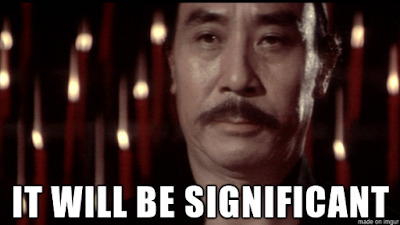
The story you are about to read is the result of Biblical and historical research about Noah’s flood and the ancient Near Eastern (ANE) context of the book of Genesis.
Translation: Because I did some research, it means that the novel is deep and elevated lit-ra-choor.
While I engage in significant creative license and speculation,
....
..................
......................................
That’s a verbose way of saying “I created a work of fiction.”
all of it is rooted in an affirmation of what I believe is the theological and spiritual intent of the Bible.
Even though there are countless Bible interpretations.
You found all of the "hidden truths"and know the "correct" way to read the Bible.

But silly me.
This is the same person who spews vitriol at movies that don't conform to his beliefs and wrote a paper called Calvinism and the Bible.
In the document, Godawa insists that "Calvinism is simply Biblical Christianity" and how the five points of Calvinism are “truly Biblical doctrines, then most of us western American Christians have been sold a bill of goods as to what the Gospel really is."
For those who are leery of such a “novel” approach,
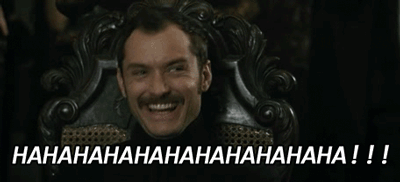
Like some other writers, Godawa believes that he has a Wildean wit.
let them consider that the traditional Sunday school image of Noah as a little old white-bearded farmer

I gotta call bullshit.
The traditional Sunday school image depicted Noah as being a white man.
It didn't emphasize that he was an old farmer.
building the ark alone with his sons is itself a speculative cultural bias.
It's been a while since I've been to CCD…
But I don't remember them ever discussing at great length on how the ark was built.
They don't deal in the minutia.
Instead they focused on educating people about their faith.
And the whole "speculative cultural bias" comment is rich...
Coming from a man who preaches in his fiction and does evangelizing podcasts with his friends.
The Bible actually says very little about Noah.
Instead we get lengthy details about who begat who and what tribe they came from.
We don’t know what he did for a living before the Flood or even where he lived.
Which is why the Midrash aggadah was written.
According to MJL, Midrash aggadah interprets biblical narrative, exploring questions of ethics or theology, or creating homilies and parables based on the text.
For instance, one of the best known midrashes is the story about Abraham.
It states while Abraham was a young child in Mesopotamia, he was smashing idols.
This story suggests that God didn't randomly pick Abraham.
Instead, God knew that Abraham would be receptive to His voice.
How do we know whether he was just a simple farmer or a tribal warrior?
The answer?
We will most likely never know for certain.
And secondly, who cares? It is minutiae.
Oh wait.
The author is going to bestow us the answer.
Genesis 9:2 says Noah “began to be a man of the soil” after the Flood, not before it.

Genesis 9:2 says this:
The fear and dread of you will fall on all the beasts of the earth, and on all the birds in the sky, on every creature that moves along the ground, and on all the fish in the sea; they are given into your hands.
(This comes from the New International Version.)
And I checked two other translations: the King James Version [KJV] and the English Standard Version [ESV].
They are the same as the first.
The passage about Noah becoming a farmer comes from Genesis 9: 20
Noah began to be a man of the soil, and he planted a vineyard. [ESV]
Noah, a man of the soil, proceeded to plant a vineyard. [NIV]
And Noah began to be an husbandman, and he planted a vineyard. [KJV]
So in conclusion:
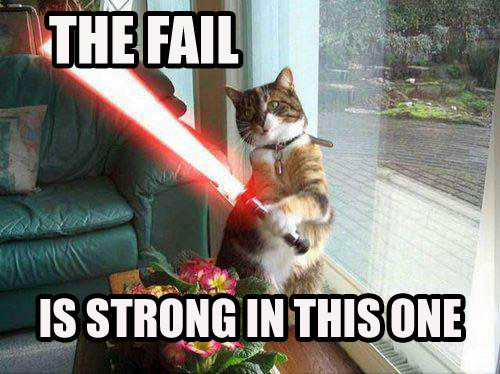
If the world before the flood was full of wickedness and violence,
Because they would all fight evil physically.
It's not like righteous men would ever combat evil by using their words or practicing non violence.
Noah would not have been that different from Abraham,
Or…
He could have been a prophet whose words inspired others.
Nobody knows for certain what Noah did prior to the flood.
who farmed, did business and led his family and servants in war against kings.
Man, Godawa is obsessed with the idea of righteous warriors.
We know very little about primeval history,

There is a newfangled thing called archaeology.
but we do learn from archeological evidence that humanity was clearly tribal during the early ages when this story takes place.
Um…
The previous line belies the rest of the sentence.
Where's the editor?
Yet, nothing is written about Noah’s tribe in the Bible.
We also don't know anything about Jesus' childhood.
Your point being?
It would be modern individualistic prejudice to assume that Noah was a loner when everyone in that Biblical context was communal.
Who ever said that he was???
Is Godawa just making up arguments so he can tear them down?
Noah surely had a tribe.
You already said that. Move along.
There is really no agreement as to the actual time and location of the event of the Flood.
And in other news…
Bears shit in the woods and the Pope is Catholic.
So B. Godawa lists some theories about when and where the Flood took place.
He thinks it is "Early Bronze Age Mesopotamian contexts" because of some passages in Genesis.
By the by... He doesn't mention any specific passages.
At some other time, I'll take a look at the appendix.
Because right now, I'm not in the mood to read an appendix that is about one hundred pages long.
The Bible also says Noah built the ark.
And now for the following news bulletin:
Adam and Eve lived in a place called the Garden of Eden.
Are we to believe that Noah built it all by himself?
Yes, if you take the Bible literally.
It doesn’t say. With his sons’ help? It doesn’t say.

But that very same book does say earlier that Cain “built a city” (some scholars believe it was Cain’s son Enoch).
Which scholars said that?
Because doing a quick Google search got me absolutely bupkis.
Instead, I got a bunch of websites that talked about Cain building a city and naming it after his son.
Are we to assume that he built an entire city by himself?
No lie… I had to check and see if Cain had a son named Enoch. (And he did).
Because after the bungling of a verse from Genesis, I wasn’t sure if this was another mistake.
As for Cain building an entire city single handedly? I’m sure Christian fundamentalists would respond with “yes”.
My response would be “no” followed by:
Who helped Cain to build a city? A lot of golems? Some demons? Or did he hire a lot of people in the nearby area?
If Cain just hired a bunch of people, wouldn't the idea of God only creating two humans [a.k.a. Adam and Eve] be false?
How did Cain get the materials to build a city?
How would Cain know which materials would be good for building a city?
And why did Cain want to build a city in the first place?

Ridiculous.
Who knew that with one word, such disdain could drip from a person’s tongue?
Cain or Enoch presided as a leader over the building of a city by a group of people,
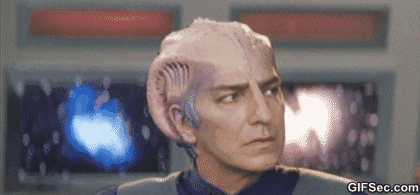
Wait a tick…
Godawa previously said that it was Cain that built a city but some scholars believe it was Enoch.
And now he is stating that it could be Cain OR Enoch.
Does that mean that Godawa forgot what he wrote previously?
Or the man who sees himself as the Grand Poobah of Biblical Knowledge is finally admitting that he doesn’t have all the answers?
just as Noah probably did with his ark.
So in other words, Noah just sat on his ass and barked orders at people.
Because as we all know, that is a great leadership style.
One of the only things Genesis says about Noah’s actual character is that he was “a righteous man, blameless in his generation. Noah walked with God” (Gen. 6:9).
Now a normal person would interpret this to mean that Noah was a good person who conversed with God.
But Noah Primeval turns Noah into a Gary Stu. (By the way, this will be revealed in future chapter snarks).
The New Testament clarifies this meaning by noting Noah as an “heir” and “herald” of righteousness by faith (Heb. 11:7; 2Pet. 2:5).
ESV [English Standard Version] said Noah as a “herald of righteousness” while NIV and KJV described Noah as a “preacher of righteousness” (2 Peter 2:5).
While ESV, NIV, and KJV all described how Noah “became an heir of righteousness.” (Hebrews 11:7).
You might be thinking to yourself: What’s your point?
If we are to take into account what the Bible said about Noah… It describes Noah spreading God’s message (like a herald or a preacher). But it also adds that because of Noah’s faith in God, he “became an heir of righteousness.”
This differs from the depiction in Noah Primeval where Noah is the Chosen One from an ancient prophecy.
And that makes him superior to all the other filthy mortals along with slightly less perfect than Jesus.
The popular interpretation of this notion of “righteousness” is to understand Noah as a virtually sinless man too holy for his time, and always communing with God in perfect obedience.
But is this really Biblical?
If you mean, some people acting like sanctimonious hypocritical assholes, then I would loudly shout “Hell yes!”
Would Noah have never sinned? Never had an argument with God?
Personally, my answers would be “no” for both questions.
But in this novel, when Noah isn't acting like a bratty teenager, he acts like a smug douchebag.
Yet the reader is supposed to see Noah as a paragon of virtue.
Never had to repent?
In order to repent, a person must have genuine remorse for their actions. It also requires accountability.
It doesn't entail a person rending their garments melodramatically until they are completely naked and then yelling at the top of their lungs. I'm looking at you, Noah Primeval.
As a matter of fact, the term “righteous” in the Old and New Testaments was not a mere description of a person who did good deeds and avoided bad deeds.
Maybe it is because the writers of the Old and New Testament know that good people are not perfect. They make mistakes and take ownership of their actions.
Righteousness was a Hebrew legal concept that meant, “right standing before God” as in a court of law.
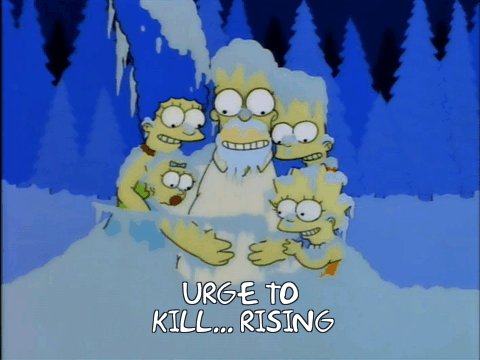
What makes me so fucking disgusted is that Godawa has no qualms with cherry picking things from different mythologies and whatever doesn’t suit his narrative is either discarded or depicted as being malevolent lies.
It carried the picture of two positions in a lawsuit, one “not in the right,” and the other, “in the right”
You mean a lawsuit involves two sides: the prosecution and the defense?
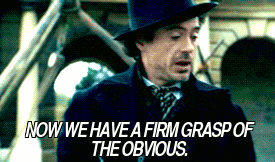
or “righteous” before God.
And this series doesn’t hesitate to jump on a soap box and shout at the top of their lungs.
It was primarily a relational term.
*Sigh*
What’s next?
Are we going to define the definition of is?
Not only that, but in both Testaments, the righteous man is the man who is said to “live by faith,” not by perfect good deeds (Hab. 2:4; Rom. 1:17).
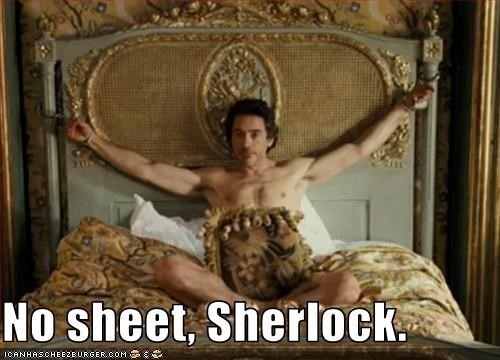
So righteousness does not mean “moral perfection” but “being in the right with God because of faith.”
In other words, ice is cold and fire is hot.
….
This is leading up to rant filled with gratuitous Bible citations.

What’s more, being a man of faith doesn’t mean a life of perfect consistency either.
You mean good people aren't perfect??? Thanks for notifying me Brian Godawa!
Look at David, the “man after God’s own heart” (Acts 13:22), yet he was a murderer and adulterer and more than once avoided obeying God’s will. But that doesn’t stop him from being declared as “doing all God’s will” by the apostle Paul.
At risk of sounding like a broken record, good people are not perfect.
Which is why repeating the obvious makes a person look like a blithering moron.
Or consider Abraham, the father of the Faith, who along with Sarah believed that God would provide them with a son (Heb. 11:8-11).
What does this have to do with anything? Is Godawa trying to dazzle the reader with how many Bible verses he can quote?
Yet, that Biblically honored faith was not perfect, as they both laughed in derision at God’s promise at first (Gen. 17:17; 18:12).
I guess Godawa never heard of a thing called context.
According to the Zohar, Sarah laughed because her son would have a feminine soul.
The Zohar also states that a soul from the "feminine world" cannot have children.
Sarah knew this and laughed because this contradicted God's promise to continue Abraham's bloodline.
God had to remind Sarah that He has the power to do anything. Which means He can turn a feminine soul into a masculine one.
And because Godawa loves to scripture drop, he cites additional examples from the Bible when people either argued or complained to God.
The very name Israel means “to struggle with God.”
I normally don't split hairs but considering the fact that the author fancies himself to be a scholar…
The word Israel means "God contends".
An alternate translation is "He Retains God"or "God Is Upright".
All the heroes in the Hebrews Hall of Faith (Heb. 11) had sinful moments, lapses of obedience and even periods of running from God’s call or struggling with their Creator.
According to the NIV translation, it commended the people for having a strong faith in God and how that faith allowed them to do what it is just. It does not give blow-blow descriptions of their spiritual struggles or a detailed accounting of all of their sins.
Now that I'm thinking about it… I have a sneaking suspicion that this is leading up to Godawa justifying his depiction of Noah.
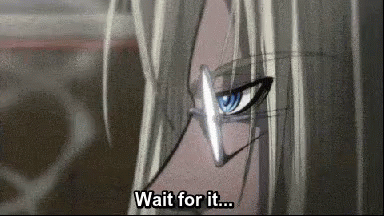
It would not be heresy to suggest that Noah may have had his own journey with God
Well, duh.
Noah's spiritual journey would have started with baby steps.
It is not like Noah would be chummy with God the very second he was born. A relationship with God is developed during a lifetime.
that began in fear and ended in faith.
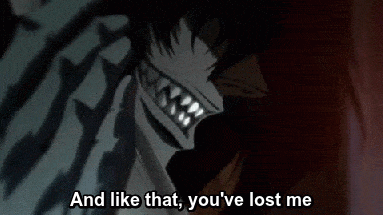
That's assuming that every person that started a relationship with God that said relationship was founded on distrust (which is fueled by fear) or the case of Noah Primeval, built on a foundation that is a passive-aggressive hate boner for the Almighty.
For some individuals, their spiritual journey never originated from animosity or distain because they always had faith.
In fact, to say otherwise is to present a life inconsistent with the reality of every human being in history.

I'll say it again.
Every person's spiritual journey with God is different.
To insist that every person's relationship with God originated from negative emotions is not based in reality.
To say one is a righteous person of faith is to say that the completed picture of his life is one of finishing the race set before him, not of having a perfect run without injuries or failures.

It is time for a writing exercise! Let’s take this wordy sentence and make it concise.
I'll go first.
The completed picture of a righteous person’s life is not a perfect run without injuries or failures but rather they finished the race set before them.
Now that I'm thinking about it …
This verbose sentence sounds like something that belongs in a fortune cookie.
Also, I find it odd that this little nugget of wisdom uses the gender neutral phrase “righteous person of faith” but then uses his | him pronouns.
Why am I getting the feeling that this is a subtle message that only a man can be a "righteous person of faith"?
Some scholars have even noted that the phrase “blameless in his generation” is an unusual one,
“They also think it is peculiar that the Flood lasted for forty days and nights. Why not eighteen or twenty-five? Is forty God’s favorite number or did He just pick it randomly?”
reserved for unblemished sacrifices in the temple.
Wait a minute.
So these scholars are stating that the phrase "blameless in his generation" is only used for animal sacrifices.
Which means Noah is likened to an animal sacrifice…
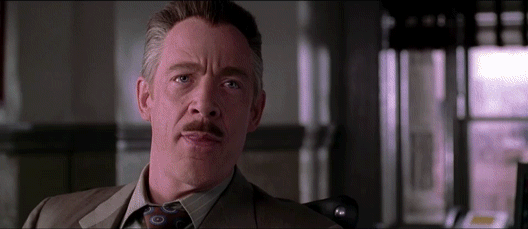
Which is totally different from Noah Primeval's depiction of Noah as a macho and virile warrior who is the Chosen One.
Also, it is really dodgy when someone only gives some citations or doesn't provide any.
This physical purity
…
The words "physical purity" just sent shivers down my spine.
Because when words like that casually enter into a conversation, it is not long before an argument is made in favor of eugenics.
takes on new meaning when understood in the genetic context of the verses
"Genetic context"?
I didn't know that words had DNA.
Flippant comment aside, all this talk of "physical purity" and "genetic context" prompted me to do a quick Google search of the following: Noah blameless in his generation animal and it brought up a thread asking if Genesis 6:9 is referring to Noah's genetic purity.
before it that speak of “Sons of God” or bene ha elohim leaving their proper abode in heaven and violating the separation of angelic and human flesh (Gen. 6:1-4; Jude 5-7).
Um…
This is sort of correct.
Genesis 6:7-4 is about the Sons of God marrying beautiful human women and having children called Nephilim. Yet it also states that humans will live to be 120.
While Jude 5-7, the writer reminds the reader that God delivered his people out of Egypt and destroyed the non-believers. They also said that the angels who "did not keep their positions of authority but abandoned their proper dwelling" along with the sinful people of Sodom and Gomorrah will be punished by "eternal fire."
Within church history,

The concept of the Grigori and Nephilim originated in Jewish folklore and legends.
At some point, early Christians either stumbled across an old scroll discussing these ideas or simply heard about it. They probably found the whole story to be fascinating and proceeded to write their own interpretations.
there is a venerable tradition of interpreting this strangest of Bible passages as referring to supernatural beings from God’s heavenly host who mate with humans resulting in the giant offspring called Nephilim.
The idea that some angels came down from Heaven to mate with humans doesn't sound bizarre to me.
Frankly, the Book of Revelation reads like John was on a big acid trip.
Other equally respectable theologians argue that these Sons of God were either humans from the “righteous” bloodline of Seth or a symbolic reference to human kings or judges of some kind.
Again, Christians didn't come with these alternate explanations. For instance, Rabbi Shimon bar Yochai strongly opposed the idea that the "benei elokim" were angels.
I have weighed in on the supernatural interpretation
That is a weird way of saying "I have decided to write a novel that depicts the Grigori as angels."
According to the Collins dictionary, the words "weighed in", means:
give an opinion or enter a discussion or argument
to measure how heavy someone is, esp. before a competition
It is important to note that The Free Dictionary and the Oxford Learner's Dictionaries has these definitions but with slightly different wording.
In conclusion?

and have provided appendices at the end of the book that give the Biblical theological foundation for this interpretation.
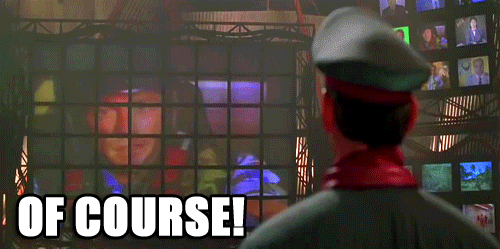
Only a filthy peasant has opinions.
An enlightened individual only believes in facts and since they are benevolent, they are imparting their wisdom to others.
This novel seeks to remain true to the sparse facts presented in Genesis (with admittedly significant embellishments)
“Admittedly significant embellishments”?
That’s putting it mildly.
More like “being preachy but insisting that you are only telling people facts.”
interwoven with theological images and metaphors come to life.

I’m sorry but I can’t take this statement seriously.
Because it reminds me of a scene in the movie The Ref when Gus is talking about how “a complex web of complications need to be weaved and woven into a quilt of some kind.”
Where I engage in flights of fancy,
That’s putting it mildly.
This story never put its feet on the ground.
such as a journey into Sheol,
Pray tell, what is Sheol?
An explanation would be nice because for all we know, Sheol is the name of a cave or a forest.
I seek to use figurative imagery from the Bible, such as “a bed of maggots and worms” (Isa. 14:11) and “the appetite of Sheol” (Isa. 5:14) and bring them to life by literalizing them into the flesh-eating living-dead animated by maggots and worms.
Let’s break this down, shall we?
Isaiah 5:14 ESV says this:
Therefore Sheol has enlarged its appetite
and opened its mouth beyond measure,
and the nobility of Jerusalem[h] and her multitude will go down,
Isaiah 5 is about the people of Israel who will be punished for their sins. This specific passage is discussing how the sinners are going to die.
Isaiah 14:11 ESV says this:
Your pomp is brought down to Sheol,
the sound of your harps;
maggots are laid as a bed beneath you,
and worms are your covers.
Isaiah 14 discusses how Babylon will be destroyed by God. This specific passage is about how the haughty King of Babylon will perish.
It still doesn’t answer the question of what Sheol is.
If we are still looking at the Bible for an explanation, the NIV translation of Isaiah 5:14 states:
Therefore Death expands its jaws, opening wide its mouth;
Also, the New International version of Isaiah 14 doesn’t use the word Sheol.
Instead, it uses the words to the grave.
Based on these translations, one can make the assumption that Sheol is the word for death or grave.
However, Sheol is a place where the souls of the dead reside.
Let's take a look at this line more closely:
bring them to life by literalizing them into the flesh-eating living-dead animated by maggots and worms.
The Bible having figurative imagery? That is not a groundbreaking revelation. Plenty of Bible scholars have written papers and or books analyzing this.
Figurative language is not supposed to be taken literally. It is used by a writer to convey an idea (example: time is a thief) or to paint a picture in a reader's mind (example: the flowers danced in the wind.)
To take something figurative and make it literal is asinine.
Also, "flesh-eating living-dead"?
I guess the word "zombie" is too plebeian.
Another player that shows up in the story is Leviathan.
“Another player”?
I bethink he is a pretentious rampallian who thinkest by using an antediluvian word maketh him intelligent and literary sir.
“Player” is an old fashioned word for actor.
It DOES NOT mean character.
So in conclusion:

While I have provided another appendix explaining the theological motif of Leviathan
Translation?
“Behold my dizzying intellect!”
as a metaphor in the Bible for chaos and disorder, I have embodied the sea dragon in this story for the purpose of incarnating that chaos as well.
One word:
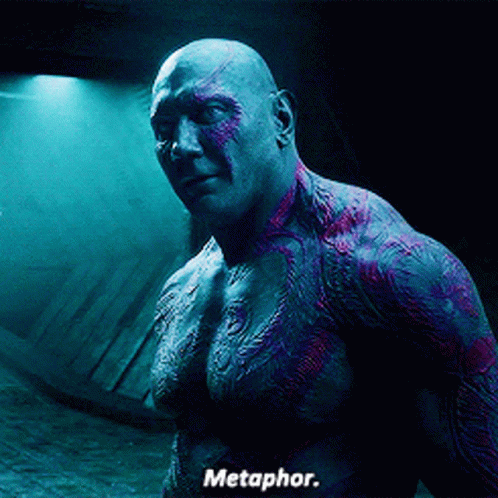
I have also literalized the Mesopotamian cosmology of a three-tiered universe with a solid vault in the heavens, and a flat disc earth supported on the pillars of the underworld, the realm of the dead.
Thanks to Brian Godawa, the words "metaphor" and "literalized" annoy me.
I'd hate to rain on your parade but Mesopotamian mythology isn't the only one who had a three-tiered universe.
Below is an image of the Hebrew cosmology:
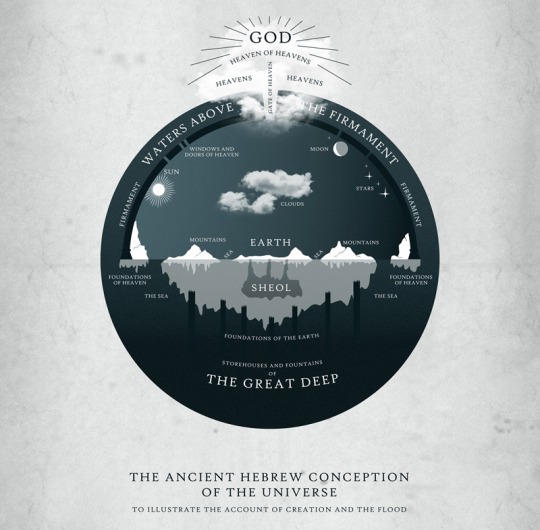
It also has an universe that has three levels: heaven, earth, and the underworld. The earth is a flat disc floating on water with heaven above it and the underworld below it.
If one takes a second look at the picture, you will notice that there are pillars or the foundation of the earth.
In conclusion, Mesopotamian mythology isn't the only one to depict a universe as being composed of three levels.
This appears to be the model assumed by the Biblical writers in many locations (Phil. 2:10; Job 22:14; 37:18; Psa. 104:5; 148:4; Isa. 40:22),

Jewish people have their own culture. They would not be using Mesopotamian mythology as their yardstick.
so I thought it would be fascinating to tell that story within that worldview unknown to most modern westerners.
You mean a different concept or an idea can be interesting? What a mind boggling revelation!
If I didn't know any better, I’d believe Godawa when he said telling a story from another culture’s point of view would be “fascinating.”
Yet it is painfully obvious that if something doesn't conform to his beliefs, it must be a vile falsehood created by malevolent beings.
The purpose of the Bible is not to support scientific theories or models of the universe,
Actually, the Big Bang Theory does not conflict with the story of creation.
but to tell the story of God through ancient writers. Those writers were people of their times just as we are.
Which is why the absence of Jewish culture is jarring.
Especially since all the "good" characters are Calvinists.
I have also woven together Sumerian and other Mesopotamian mythology in with the Biblical story,
It is randomly inserted (ex: Pazuz) or the deities are evil fallen angels who are destroying Family Values™ and Corrupting the Children™.
but with this caveat:
"Anything that doesn't conform to my worldviews must be the lies devised by Satan."
Like C.S. Lewis,
Did he compare himself to C.S. Lewis?
….
……….
…………………….
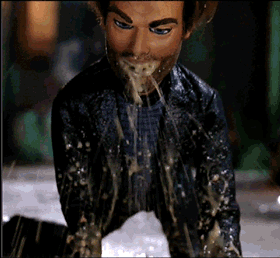
It is like trying to compare M. Night Shyamalan to Alfred Hitchcock.
Even though one is a hack while the other one is a talented creator.
I believe the primary purpose of mythology is to embody the worldview and values of a culture.
Aside from helping people to understand the world around them and giving them answers to timeless questions such as: Is there life after death? Why does evil exist?
Mythology also provides a form of entertainment and ensures that certain traditions survive.
But all myths carry slivers of the truth and reflect some distorted vision of what really happened.

This reeks of ethnocentrism!
Sumer’s Noah was Ziusudra, Babylon’s Noah was Utnapishtim, and Akkad’s was Atrahasis. The Bible’s Noah is my standard.
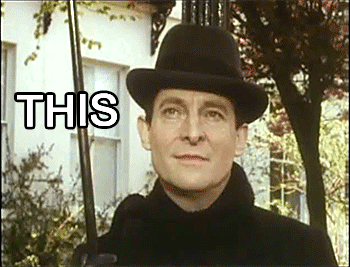
I'll bring this up if anyone tries to claim that Noah Primeval isn't preachy and ethnocentric.
So my goal was to incorporate real examples of ANE history and myth in subjection to that standard in such a way that we see their “true origin.”
....
You know what?
If someone wrote a Wiccan based fantasy series that demonized Christianity, he would be outraged.
Godawa reiterates his "speculation" that the deities were fallen angels with superhuman abilities that once belonged to God's divine council.
See the appendix at the back for my defense of this interpretation from the Bible.

I'm not in the mood to read a lengthy appendix that reads like you giving yourself a giant pat on the back. Perhaps that will be a future snark.
Lastly, I have permitted myself to use extra-Biblical Jewish literature from the Second Temple period as additional reference material for my story.
In other words...
He gave himself permission to steal and vandalize a different culture. Isn't that charming?
I use these ancient Jewish sources
I bet many people wished you hadn't.
not because I consider them completely factual or on par with the Bible,
"They are complete heresy. Instead, believe in the teachings of John Calvin."
but simply in an attempt to incarnate the soul of the ancient Hebrew imagination in conversation with the text of Scripture
Like the Yeti, the Hebrew imagination has yet to be found.
rather than imposing my own modern western one upon the text.
...
............
............................

I am within the tradition of the Church on this since authors of the New Testament as well as early Church Fathers
Just "Church Fathers"?

Christianity also had Church Mothers.
To name a few: Mary Magdalene, Phoebe, Junia, Lydia, Eudia, Thecla, Syntyche, and Prisca.
and other orthodox theologians in church history respected some of these ancient manuscripts as well.
While the author did the opposite.
Many of these texts from the Second Temple Period, such as Jubilees, Testaments of the Twelve Patriarchs or The Life of Adam and Eve, and others found in the Pseudepigrapha, were creative extrapolations of the Biblical text.
I guess the word of the day is "extrapolations".
Extrapolation is defined as "to predict by projecting past experience or known data" or " to infer from values within an already observed interval."
I find it rather disgusting to imply that the Midrash is a product of guesswork or estimates.
Which means whatever the author's personal beliefs are founded in facts.

These were not intended to deceive or overturn the Bible,
Notice the word "intended".
It infers that the writers weren't deliberately telling lies.
It just happens that they were spreading falsehoods.
but rather to retell Biblical stories with theological amplification and creative speculation

You see, humans are a curious species. We don't like unanswered questions.
Therefore, we come up with a possible answer or an explanation for a particular event.
The purpose of the Midrash is to provide explanations or to give a story details.
Ever wondered who was Cain's wife? According to Book of Jubilees, she was Cain's sister and her name is Awan.
while remaining true to their interpretation of the Scriptures.

They weren't providing interpretations to Mesopotamian mythology.
In short, I am not writing Scripture.
Normally, I would believe this.
But subsequent interviews and podcasts along with the preachy messages written in the story belies this statement.
I am not even saying that I believe this is how the story might have actually happened.
Remember when I said to keep something in mind because it will be significant later on?
Well, now it is important.
This statement and the words "Inspired by True Events" are contradictory.
I am simply engaging in a time-honored tradition of the ancient Hebrew culture:
No, no, no!
Do not pass go. Do not collect $200!
I am retelling a Biblical story in a new way to underscore the theological truths within it.

Godawa only wants to associate with ancient Hebrew culture when it elevates him as a writer and his stories.
From his remarks, it is obvious that he regards the Midrashes as being subpar bodies of work that will mislead undiscerning readers.
That being said, that won't stop him using such texts in order to receive praise for his "creativity" and be commended in scholarly circles for using Jewish texts.
This mentality is similar to Rick Riordan's.
In case anyone doesn't know...
Rick Riordan is best known for writing the Percy Jackson series which retold Greek mythology. He then wrote a series based on Norse mythology called Magnus Chase and the Gods of Asgard.
Both series were a hit and he greatly profited from these stories.
After sometime, Riordan made the following statements:
“I didn’t realize some people still worship the old Viking gods. Very strange, and a little scary…In my opinion, the more you learn about the mythology, the more impossible it is to take it seriously as a religion… after you’ve met Odin and Thor in the stories, who in their right mind would ever want to worship them?”
" I love Greek myths, but why anyone would want to worship the Greek pantheon is beyond me. "
"It’s strange to think anyone would still worship the Olympians seriously."
Early in the book, the character Chiron draws a clear distinction between God, capital-G, the creator of the universe, and the Greek gods (lower-case g). Chiron says he does not wish to delve into the metaphysical issue of God, but he has no qualms about discussing the Olympians because they are a “much smaller matter.”
Unsurprisingly, this offended many polytheists.
You might be wondering: what's my point?
To put it simply? Both writers profited from incorporating different mythologies into their stories.
One writer made disparaging remarks about individuals who believe in these deities after becoming a best selling author.
While the other barely concealed their disdain for the source material they used that garnered their popularity and praise from critics.
In conclusion?
Don't build your career on writing stories using different mythologies and deride the believers of said mythos or the very thing that puts money in your bank account.
Then wonder why some people think you are a horse's ass.
The Biblical theology that this story is founded upon is provided in several appendixes at the back of the book for those who are interested in going deeper.
First of all..
Stop peddling your friggin' appendixes.
We get it.
It has citations.
Which means it is supposed to be scholarly...
Therefore... It is deep and elevated literature.
The beauty of fiction
Um, no.
It is not all beautiful.
It can also be bland or terrible.
And in some cases, it is deeply disturbing.
is that we can make assumptions regarding uncertain theological and historical information
Yes, you can.
Up to a point.
The moment when you insist theses assumptions or personal beliefs are based in fact...
Writers like Philippa Gregory and Brian Godawa are born.
without having to prove them one way or another.
You know what also doesn't require proof?
Faith.
The story requires only that we establish continuity within the made up world,

It is called the suspension of disbelief.
and accepting those assumptions for the sake of the story does not imply theological agreement.
Normally, yes.
But this series makes it abundantly clear that if you don't agree with the political and theological beliefs...
At best, you are country pumpkin. (Yes, he does equate them to being stupider than Ana Steele.)
At worst, you are not only a moron but a depraved degenerate as well.
So, sit back and
Reach for the booze because you are going to need it. Also, make sure that the vomit bucket is in front of you.
let your imagination explore the contours of this re-imagined journey
And before long, wishing that you never did and longing to depart for the Undying Lands.
of one of the most celebrated religious heroes across all times and cultures.
And by the end, you want:
To repeatedly punch the "good" characters in the throat and stab them in the groin. Especially Noah.
The villains to shut up and fuck off. Because they are what a thirteen years old boy would think is edgy. Especially if said boy was also a Bible thumper.
1 note
·
View note
Text
Should Your Child Watch TV News? Surprising Opinions of Top Anchors

KIDS AND THE NEWS
More than ever, children witness innumerable, sometimes traumatizing,
news events on TV. It seems that violent crime and bad news is unabating.
Foreign wars, natural disasters, terrorism, murders, incidents of child abuse,
and medical epidemics flood our newscasts daily. Not to mention the grim
wave of recent school shootings.
All of this intrudes on the innocent world of children. If, as psychologists
say, kids are like sponges and absorb everything that goes on around them,
how profoundly does watching TV news actually affect them? How careful do
parents need to be in monitoring the flow of news into the home, and how can
they find an approach that works?
To answer these questions, we turned to a panel of seasoned anchors, Peter
Jennings, Maria Shriver, Linda Ellerbee, and Jane Pauley--each having faced the
complexities of raising their own vulnerable children in a news-saturated
world.
Picture this: 6:30 p.m. After an exhausting day at the office, Mom is busy
making dinner. She parks her 9-year-old daughter and 5-year-old son in front
of the TV.
"Play Nintendo until dinner's ready," she instructs the little ones, who,
instead, start flipping channels.
Tom Brokaw on "NBC News Tonight," announces that an Atlanta gunman
has killed his wife, daughter and son, all three with a hammer, before going on
a shooting rampage that leaves nine dead.
On "World News Tonight," Peter Jennings reports that a jumbo jetliner with
more than 300 passengers crashed in a spinning metal fireball at a Hong Kong
airport.
On CNN, there's a report about the earthquake in Turkey, with 2,000
people killed.
On the Discovery channel, there's a timely special on hurricanes and the
terror they create in children. Hurricane Dennis has already struck, Floyd is
coming.
Finally, they see a local news report about a roller coaster accident at a New
Jersey amusement park that kills a mother and her eight-year-old daughter.
Nintendo was never this riveting.
"Dinner's ready!" shouts Mom, unaware that her children may be terrified
by this menacing potpourri of TV news.
What's wrong with this picture?
"There's a LOT wrong with it, but it's not that easily fixable," notes Linda
Ellerbee, the creator and host of "Nick News," the award-winning news
program geared for kids ages 8-13, airing on Nickelodeon.
"Watching blood and gore on TV is NOT good for kids and it doesn't do
much to enhance the lives of adults either," says the anchor, who strives to
inform children about world events without terrorizing them. "We're into
stretching kids' brains and there's nothing we wouldn't cover," including
recent programs on euthanasia, the Kosovo crisis, prayer in schools, book-
banning, the death penalty, and Sudan slaves.
But Ellerbee emphasizes the necessity of parental supervision, shielding
children from unfounded fears. "During the Oklahoma City bombing, there
were terrible images of children being hurt and killed," Ellerbee recalls. "Kids
wanted to know if they were safe in their beds. In studies conducted by
Nickelodeon, we found out that kids find the news the most frightening thing
on TV.
"Whether it's the Gulf War, the Clinton scandal, a downed jetliner, or what
happened in Littleton, you have to reassure your children, over and over again,
that they're going to be OK--that the reason this story is news is that IT
ALMOST NEVER HAPPENS. News is the exception...nobody goes on the air
happily and reports how many planes landed safely!
"My job is to put the information into an age-appropriate context and lower
anxieties. Then it's really up to the parents to monitor what their kids watch
and discuss it with them"
Yet a new study of the role of media in the lives of children conducted by
the Henry J. Kaiser Family Foundation reveals that 95% of the nation's children
ages 8-18 are watching TV without their parents present.
How does Ellerbee view the typical scenario of the harried mother above?
"Mom's taking a beating here. Where's Dad?" Ellerbee asks.Perhaps at work,
or living separately from Mom, or absent altogether.
"Right. Most Moms and Dads are working as hard as they can because we
live in a society where one income just doesn't cut it anymore,"
NBC News correspondent Maria Shriver, the mother of four--Katherine,
13, Christina, 12, Patrick, 10, and Christopher, 6--agrees with Ellerbee: "But
Moms
aren't using the TV as a babysitter because they're out getting manicures!"
says the 48-year-old anchor.
"Those mothers are struggling to make ends meet and they do it because
they need help. I don't think kids would be watching [as much TV] if their
parents were home organizing a touch football game.
"When I need the TV as a babysitter," says Shriver, who leaves detailed TV-
viewing instructions behind when traveling, "I put on a safe video. I don't mind
that my kids have watched "Pretty Woman" or "My Best Friend's Wedding"
3,000 times. I'd be more fearful if they watched an hour of local news.That
would scare them. They might feel: 'Oh, my God, is somebody going to come
in and shoot me in my bedroom?'"
In a move to supervise her own children more closely since her husband,
Arnold Schwarzenegger, became Governor, Shriver
scaled back her workload as Contributing Anchor to Dateline NBC and set up
her office at home: "You can never be vigilant enough with your kids," she
says, "because watching violence on TV clearly has a huge impact on
children--whether it's TV news, movies, or cartoons."
This view is shared by the American Academy of Child and Adolescent
Psychiatry, which states: ""TV is a powerful influence in developing value
systems and shaping behavior...studies find that children may become immune
to the horror of violence; gradually accept violence as a way to solve problems;
and resort to anti-social and aggressive behavior, imitating the violence they
observe."
Although there are no rules about watching TV in 49% of the nation's
households, TV-watching at the Schwarzenegger home is almost totally
verboten:
"We have a blanket rule that my kids do not watch any TV at all during the
week," she notes, "and having a TV in their bedrooms has never been an
option. I have enough trouble getting them to do their homework!" she states
with a laugh. "Plus the half hour of reading they have to do every night.
According to the Kaiser survey, Shriver's household is a glaring exception to
the rule. "Many kids have their own TV's, VCR's and video games in their
bedroom," the study notes. Moreover, children ages 8-18 actually spend an
average of three hours and 16 minutes watching TV daily; only 44 minutes
reading; 31 minutes using the computer; 27 minutes playing video games;
and a mere 13 minutes using the Internet.
"My kids," Shriver explains, "get home at 4 p.m., have a 20-minute break,
then go right into homework or after-school sports. Then, I'm a big believer in
having family dinner time. Some of my fondest memories are of sitting at the
dinner table and listening to my parents, four brothers, and my grandmother,
Rose. We didn't watch the news.
"After dinner nowadays, we play a game, then my kids are in bed, reading
their books. There's no time in that day for any TV, except on weekends, when
they're allowed to watch a Disney video, Sesame Street, Barney, The Brady
Bunch, or Pokemon."
Beyond safe entertainment, Shriver has eliminated entirely the option of her
children watching news events unfolding live on TV: "My kids," she notes, "do
not watch any TV news, other than Nick News," instead providing her children
with Time for Kids, [Teen Newsweek is also available], Highlights, and
newspaper clippings discussed over dinner.
"No subject should be off-limits," Shriver concludes, "but you must filter
the news to your kids."
ABC's Peter Jennings, who reigns over "World News Tonight," the nation's
most-watched evening newscast, emphatically disagrees with a censored
approach to news-watching: "I have two kids--Elizabeth is now 24 and
Christopher is 21-- and they were allowed to watch as much TV news and
information anytime they wanted," says the anchor. A firm believer in
kids understanding the world around them, he adapted his bestselling book,
The Century, for children ages 10 and older in The Century for Young People.
No downside to kids watching news? "I don't know of any downside and I've
thought about it many times. I used to worry about my kids' exposure to
violence and overt sex in the movies. Like most parents, I found that although
they were exposed to violence sooner than I would have liked, I don't feel
they've been affected by it. The jury's still out on the sex.
"I have exposed my kids to the violence of the world--to the bestiality of
man--from the very beginning, at age 6 or 7. I didn't try to hide it. I never
worried about putting a curtain between them and reality, because I never felt
my children would be damaged by being exposed to violence IF they
understood the context in which it occurred. I would talk to my kids about the
vulnerability of children in wartime--the fact that they are innocent pawns--
and about what we could do as a family to make the world a more peaceful
place.
Jennings firmly believes that coddling children is a mistake: "I've never
talked down to my children, or to children period. I always talk UP to them and
my newscast is appropriate for children of any age."
Yet the 65-year-old anchor often gets letters from irate parents: "They'll
say: 'How dare you put that on at 6:30 when my children are watching?' My
answer is: 'Madam, that's not my problem. That's YOUR problem. It's
absolutely up to the parent to monitor the flow of news into the home."
Part of directing this flow is turning it off altogether at meal-time, says
Jennings, who believes family dinners are sacrosanct. He is appalled that the
TV is turned on during meals in 58% of the nation's households, this according
to the Kaiser study.
"Watching TV during dinner is unforgivable," he exclaims, explaining that
he always insisted that his family wait until he arrived home from anchoring
the news. "You're darn right they waited...even when my kids were tiny, they
never ate until 7:30 or 8 pm. Then we would sit with no music, no TV. Why
waste such a golden opportunity? Watching TV at mealtime robs the family of
the essence of the dinner, which is communion and exchange of ideas. I mean,
God, if the dinner table is anything, it's a place to learn manners and
appreciation for two of the greatest things in life--food and drink."
Jennings is likewise unequivocal in his view of junk TV and believes parking
kids at the tube creates dull minds: "I think using TV as a babysitter is a
terrible idea because the damn television is very narcotic, drug-like. Mindless
TV makes for passive human beings--and it's a distraction from homework!
"My two children were allowed to watch only a half an hour of entertainment
TV per night--and they never had TV's in their bedrooms.It's a conscious
choice I made as a parent not to tempt them...too seductive..."
Adds Ellerbee: "TV is seductive and is meant to be. The hard, clear fact is
that when kids are watching TV, they're not doing anything else!"
Indeed, according to the National Institute on Out-of-School Time and the
Office of Research Education Consumer Guide, TV plays a bigger role in
children's lives now than ever before. Kids watch TV an average of14 to 22
hours per week, which accounts for at least 25 percent of their free time.
"Dateline NBC" Anchor Jane Pauley, intensely private, declined an interview
to discuss how she and her husband, cartoonist Garry Trudeau ("Doonesbury")
handle TV-watching with their three teens, two of whom are fraternal twins.
But in a written response, she agreed that kids need to be better protected
from the onslaught of violence: "I was a visitor at a public elementary school
not long ago, and was invited to peek in on a fourth-grade class on 'current
events.' The assignment had been to watch the news and write about one of
the stories. Two kids picked the fatal attack on a child by a pit bull and the
other wrote about a child who'd hanged herself with a belt! They'd all watched
the worst blood and gore 'News at 11' station in town. The teacher gave no
hint that she was as appalled as I was. My response was to help the school get
subscriptions to "Time for Kids" and "My Weekly Reader." People need to be
better news consumers. And tabloid TV is very unhealthy for kids."
On this point, Ellerbee readily agrees:"I really do believe the first
amendment STOPS at your front door. You are the boss at home and parents
have every right to monitor what their kids watch. What's even better is
watching with them and initiating conversations about what they see.If your
child is watching something terribly violent, sit down and DEFUSE it. Talking
makes the ghosts run...and kids can break through their scared feelings."
Adds Pauly:
"Kids," she maintains, "know about bad news--they're the ones trying to
spare us the bad news sometimes. But kids should be able to see that their
parents are both human enough to be deeply affected by a tragedy like
Columbine, but also sturdy enough to get through it...and on with life. That is
the underpinning of their security."
"I'm no expert on the nation's children," adds Jennings, " but I'd have to say
no, it wasn't traumatic. Troubling, shocking, even devastating to some,
confusing to others, but traumatizing in that great sense, no.
"Would I explain to my kids that there are young, upset, angry, depressed
kids in the world? Yes. I hear the most horrendous stories about what's going
on in high schools from my kids. And because of the shootings, parents are
now on edge--pressuring educators to 'do something.' They have to be
reminded that the vast majority of all schools in America are overwhelmingly
safe," a fact borne out by The National School Safety Center, which reports that
in l998 there were just 25 violent deaths in schools compared to an average of
50 in the early 90's.
Ellerbee adds that a parent's ability to listen is more important than
lobbying school principals for more metal detectors and armed guards: "If
there was ever a case where grown-ups weren't listening to kids, it was
Littleton. First, don't interrupt your child...let them get the whole thought out.
Next, if you sit silently for a couple of seconds after they're finished, they'll
start talking again, getting to a second level of honesty. Third, try to be honest
with your kid. To very small children, it's proper to say: 'This is never going to
happen to you...' But you don't say that to a 10-year-old."
Moreover, Ellerbee believes that media literacy begins the day parents stop
pretending that if you ignore TV, it will go away. "Let your kid know from the
very beginning that he or she is SMARTER than TV: 'I am in control of this box,
it is not in control of me. I will use this box as a useful, powerful TOOL, but will
not be used by it.' Kids know the difference.
"Watching TV," Ellerbee maintains, "can makes kids more civilized. I grew
up in the south of Texas in a family of bigoted people. Watching TV made me
question my own family's beliefs in the natural inferiority of people of color.
For me, TV was a real window that broadened my world."
Ironically, for Shriver, watching TV news is incredibly painful when the
broadcast is about you. Being a Kennedy, Shriver has lived a lifetime in the
glare of rumors and
televised speculation about her own family. Presenting the news to her children
has therefore included explaining the tragedies and controversies the
Kennedys have endured. She was just eight years old when her uncle, President
John F. Kennedy, was assassinated: "I grew up in a very big shadow...and I
couldn't avoid it," she admits. "It wasn't a choker, but it was a big
responsibility that I don't want my own children to feel." Yet doesn't her 15-
year marriage to megastar Schwarzenegger add yet another layer of public
curiosity close to home? "My kids are not watching Entertainment Tonight--no,
no, never! And I don't bring them to movie openings or Planet Hollywood. I
think it's fine for them to be proud of their father, but not show off about him."
How does she emotionally handle news when her family's in it? "That's a line
I've been walking since my own childhood, and it's certainly effected the kind
of reporter I've become. It's made me less aggressive. I'm not [in the news
business] to glorify myself at someone else's expense, but rather to report a
story without destroying someone in the process. A producer might say: 'Call
this person who's in a disastrous situation and book them right way.' And I'm
like: 'Ahhhh. I can't even bring myself to do it,' because I've been on the
other side and know the family is in such pain." Read more here ข่าวไอที
A few years ago, of course, the Kennedys experienced profound pain, yet
again, when Shriver's beloved cousin, John F. Kennedy, Jr., was killed in a plane
crash, with his wife, Carolyn, and sister-in-law, Lauren Bessette. A blizzard of
news coverage ensued, unremitting for weeks. "I didn't watch any of it...I was
busy, " Shriver says quietly. "And my children didn't watch any of it either."
Shriver was, however, somewhat prepared to discuss the tragedy with her
children. She is the author of the best-selling "What's Heaven?" [Golden Books],
a book geared for children ages 4-8, which explains death and the loss of a
loved one. "My children knew John well because he spent Christmases with us. I
explained what happened to John as the news unfolded...walked them through
it as best I could. I reminded them that Mommy wrote the book and said:
'We're not going to see John anymore. He has gone to God...to heaven...and we
have to pray for him and for his sister [Caroline] and her children."
Like Shriver, Jennings is personally uncomfortable in the role of covering
private tragedies in a public forum: "In my shop, I'm regarded as one of those
people who drags their feet a lot at the notion of covering those things," he
explains. "During the O.J. Simpson trial, I decided not to go crazy in our
coverage--and we took quite a smack and dropped from first to second in the
ratings. TV is a business, so when a real corker of a story like Princess Diana's
death comes along, we cover it. I think we're afraid not to do it. We're guilty of
overkill, and with Diana, we ended up celebrating something that was largely
ephemeral, making Diana more than she was. But audiences leap up!
"I was totally opposed to covering John F. Kennedy, Jr.'s funeral, because I
saw no need to do it. He wasn't a public figure, though others would say I was
wrong. On-air, I said: 'I don't think the young Mr. Kennedy would approve of
all this excess...' But we did three hours on the funeral and it turned out to be
a wonderful long history lesson about American politics and the Kennedy
dynasty's place in our national life.
"Sometimes," Jennings muses, "TV is like a chapel in which we, as a nation,
can gather to have a communal experience of loss.We did it with the
Challenger, more recently with JFK Jr.'s death and we will do it shortly, I
suspect, though I hope not, with Ronald Reagan. It's not much different than
what people did when they went West in covered wagons in the last century.
When tragedy struck, they gathered the wagons around, lit the fire, and talked
about their losses of the day. And then went on. Television can be very
comforting."
In closing, Ellerbee contends that you can't blame TV news producers for
the human appetite for sensational news coverage that often drags on for days
at a time:
"As a reporter," she muses, "I have never been to a war, traffic accident, or
murder site that didn't draw a crowd. There is a little trash in all of us. But the
same people who stop to gawk at a traffic accident, may also climb down a well
to save a child's life, or cry at a sunset, or grin and tap their feet when the
parade goes by.
"We are NOT just one thing. Kids can understand these grays...just as
there's more than one answer to a question, there is certainly more than one
part to you!
1 note
·
View note
Text
Beeble Mis 5b : Who Gave You A Gun?!?
PREVIOUSLY on BBC Les Mis: it was Barricade Time, babey!
I’m trusting people better with geographical/layout descriptions than me will take this one. But other points:
- I give Wardrobe hell in this show and I do not take it back, but also let me say they’re doing a solid job on lower-class clothing. I especially like the poor woman in the march whose outfit is almost complete but her overblouse is too small and shows the lacing of her corset at her waist-- not sexy at all, it looks exactly like what it is, not being able to make/afford a top that really fits.
- ... A Riot Occurs! And okay yeah, listen, I’ve been trying really hard to evaluate this show as This Show, just an adaptation of the book, as Davies emphasized it was. But this is a very 2012 way to film the chaos as the riot erupts. I’m not saying it’s bad! I actually think it works! I just also think it’s Very Samey, and there are other ways to film chaotic sequences.
- The worker from The Something Cafe earlier (who I think may have been the one Enjolras saved earlier too?) comes up as they’re starting to build the barricade and is all WELCOME COMRADE and they are obviously really solid with each other and why Why WHY isn’t this worker just Feuilly?!? Enjolras has a canonical Worker Activist Bestie! It would have been a fine thing to go with!
...Were they afraid of mispronouncing “Feuilly”? because. I could understand that.
- “There’s only one line of attack!” says Enjolras and okay this is the kind of thing that people in genre shows say before being attacked from behind but it’s also like the whole deal with the Corinthe barricade so
- there’s a flag that I *think* has the date of the July Revolution on it? Not sure? Can anyone confirm?
- Grantaire grabs HALF A STOOL yes very good Grantaire
- Matelote is here! With a cockade in her hair! Slapping Grantaire in the face AS HE RICHLY DESERVES
- I am loving this HISTORICALLY ACCURATE multiracial and multigender crowd! Thank you!
- And now it’s time for COMEDY JAVERT!!! He is going to the barricades in his STEALTH CAP because he cannot TRUST anyone else to apprehend Jean Valjean! Who will definitely be IN THE VERY CENTER of the rioting! At...a small barricade..on an obscure street... with only 40-50 defenders...
you know if the IRL Official Intel had been this Hot and Happenin’, Charles Jeanne and Co. might have won:P
-BACK TO THE BARRICADE BUILDING, Gavroche steals the Mean Barber’s Plaster Head and Wig for and brings it along? for reasons?? , and then encounters Mabeuf
--okay Mabeuf being here is a Great Example of the way this series so often brings in canon details but gutted of the context that really makes them matter. We’ve seen nothing of his slide into poverty, his struggle, his desperation; there’s no reason to think there’s anything to him showing up (with tricolor sash!) except a genuine determination to Do His Part. I’m not sorry he’s here; I’m sorry it doesn’t tie in with anything else more.
- ...if Feuilly were here they’d be building a better barricade
- JAVERT IS HERE! ON THE CASE! TRACKING DOWN THE NOTORIOUS REBEL JEAN VALJEAN I’m sorry this is forever hilarious
ACTUAL DIALOGUE:
Javert, Super Casual: Is a man named Jean Valjean with us?
Quinnjolras, who very realistically has no idea who tf JVJ is: Not that I know of
Javert, Super Smoothlike And Very Casual: He’ll be in the thick of it,MARK MY WORDS
Sadly then we of course cut to : Jean Valjean! or rather Cosette, trying to sneak out past Jean Valjean. And Marius! Sneaking into the Garden House!
And it’s all very nicely paralleled with them both being quiet and Marius is looking in a window and Cosette has her hands on the doorknob to step outside
and VALJEAN ATTACKS HER FROM BEHIND LIKE A HORROR MOVIE MONSTER
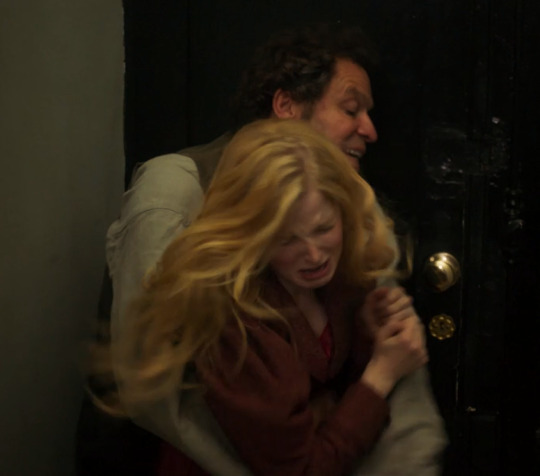
HOLY SHIT
she screams and begs to be let go, and he just! won’t ! he keeps Ever So Calm as he physically restrains her, calmly telling her that oh, it’s dangerous Out There, as opposed to in HERE, with a frigging superhuman keeping her restrained
he finally lets her escape back up the stairs and she yells I HATE YOU which is honestly seeming less Spunky Teen and more TOTALLY JUSTIFIED ACT OF BRAVE DEFIANCE
holy shit
holy shit
I hate this Valjean so much y’all, this is so bad
the camera pulls away and shows us he is A Sad but !! I don’t care! Don’t PHYSICALLY RESTRAIN YOUR TEENAGER AND LOCK HER IN THE HOUSE
at this point in the recap I actually had to take a break and get some tea because holy shit
but okay. Okay. I’m back.
--and the scene is MERCIFULLY back to the House With Gardens In, where Marius is having an Existential Crisis and Eponine...is trying to convince him to live? and hook up with her? But she Name Drops the Chanvrerie Barricade apparently by mistake, here because this is the Les Mis where Women Aren’t Given Much to Thinking, and so Marius goes off to Die , as Marii do
then it’s back to the barricade! Where Courfeyrac , Mabeuf and Gavroche arrive at the head of a bunch of new recruits! Through the alley....into the barricade with only One Line of Attack...hhhhyeahhh. I . I get where like you couldn’t do a MASSED charge from that alley but it would be REAL easy to do a smaller distraction sortie? I think?
eh, I’m not Battle Tactics Blogger , back to the plot.
Gavroche spots Javert and immediately rumbles him; Enjolras and Courfeyrac and Not!Feuilly etc seize him and take him hostage. Go Team!
And then it’s evening,and all across Paris the lights are...doing things and people are singing!
But There is No Joy in Corinth, Except For Me! because Javert is tied to a post! and HILARIOUSLY YELLING ABOUT JEAN VALJEAN.
Actual Dialogue: WHERE IS HE! YOUR LEADER! JEAN VALJEAN!
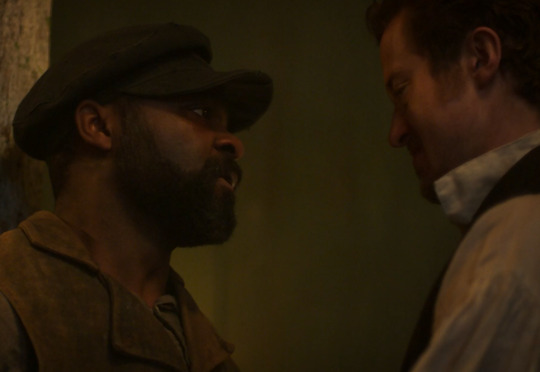
I’m glad Quinnjolras thinks this is as funny as I do
Javert, to a group of armed revolutionaries: You’re mistaken, my friend! You’ve ALL BEEN LED ASTRAY.
Javert, my guy, I hate this Valjean too, but I don’t think he’s behind POLITICAL ISSUES IN PARIS.
Quinnjolras gets a We’re Not Assassins line when Gav makes to shoot Javert; I am pleased!
Meanwhile Not!Feuilly and Friends are outside watching the barricade; they call that the first charge is coming.
The first charge goes pretty well, Dramatic Fight Scene wise! Quinnjolras gets the barricade to use Good Bullet Economy, and is convincing as a combat leader, at least in this moment. Courfeyrac...gives the impression of being someone totally new to this, but getting the hang of it. Gavroche is Super Pumped and kills someone with Javert’s musket I think? (WHO GAVE HIM A GUN). (Bossuet I am pretty sure is killed.) And Grantaire, who has a gun somehow (WHO GAVE YOU A GUN)...gets an actual look at violence and shuts down. For any of the others,I’d be deeply annoyed by this, but it’s a good way of showing the basic Issue here: Grantaire has no real violence in him. He can be a jerk , but he doesn’t have the conviction to carry himself over the horrors of dealing real harm or real death--or seeing it come to others. War is genuinely awful! and he’s really not capable of this. It’s a good moment, and fits with the new way they’re doing his arc so far.
...and then as I’m appreciating this, and as the barricade is celebrating, it’s time to Raise the Flag! And Mabeuf volunteers! And Quinnjolras is like”hahah no grampa it’s fine” and Mabeuf says “I said I’ll do it”, and climbs up the barricade all awkward. And Not!Feuilly looks over at Enjolras like ??? and Enjolras does that shrug that means ‘Hey I Tried But Grampa Won’t Stop’ and Mabeuf puts up the flag and everyone goes YAAAAAY and Marius sneaks onto the barricade and Mabeuf gets shot.
And I just...it’s Shocking and it’s Sad in a Hey An Old Man Died sort of way, but it’s All Wrong for tone and context. The raising of the flag is supposed to be an obviously dangerous, essentially suicidal act of courage, that requires stepping into the line of open fire ; something even Enjolras hesitates to do. Mabeuf’s courage terrifies everyone , terrifies Enjolras ; Mabeuf inspires them all by his willing sacrifice, and becomes to the barricade a reminder of the courage of the Grand Revolution.
Here, putting up the flag is A Bit of A Chore; no one seems very tense about it; everyone’s watching calmly and laughing and cheering as it goes. Mabeuf’s death is Shocking, a Reminder that There Is Danger , not a foregone conclusion (and of course there’s no mention of the original Revolution as a positive inspiration). We, the viewer, don’t know about Mabeuf’s downward spiral in life, so we can’t link it to this decision, can’t see this as an act of protest and despair. Courfeyrac doesn’t know Mabeuf, so he doesn’t correct Enjolras on Mabeuf’s politics; he just seems shaken and lost by this Unexpected Death.
Mabeuf’s death is, essentially, reframed, from being a conscious, heroic , inspiring sacrifice to group of fighters who felt their courage wavering, to a Sad Loss That Awakens Everyone to The Horror Of Battle. Someone might like this choice of approach more; but it IS a choice, and a heavy one in terms of symbolism (even as it loses the commentary on symbolism!).
Anyway. Next wave of combat happens, Grantaire Nopes Out into the Corinthe (WHO GAVE YOU A BOOZE), Gavroche heads back into combat with a pistol (WHO GAVE YOU YET ANOTHER GUN) Marius RAUUUUGHS up and into Battle with the Gunpowder. It’s good! Kind of hilarious but good! The Barricade Is Saved and also happy about it instead of scolding him! GOOD !
and then Marius has a whole “it’s EASY when you DON’T VALUE YOUR LIFE” bit and Quinnjolras is like “Ungroovy , Comrade Buddy” and Marius walks down to the street level and a guard is Still Alive!1!1, and shoots at him! and hogad, Eponine sort of . Hurls herself across screen and falls in a heap RIGHT AT THE FOOT OF THE MAIN PASSAGE ON THE BARRICADE and Enjolras shoots the guard and is like “see some of us still value your life you drama llama” and i just
are they gonna move her or
--anyway , her Death Scene is very good until the odd change in final line; the shift from “I believe I was a little bit in love with you” to “I really did love you” is actually! a pretty major shift! but whatever ; Erin Kellyman did a wonderful job with the whole scene and for once I believe this Marius is truly sad at the passing of a life
The next bit with the letter is really cool! Let me give credit for that! Marius reads the letter Eponine gave him, while Valjean discovers Cosette’s blotter and reads it in a reflective plate-- a nice bit of symmetry and a cool way to use a book detail to unite the branches of the story! Valjean realizes Cosette is already lost to him-- “in her heart she’s gone” -- and I could not care less for the grief of Shouty Dragsalot, but it’s well acted for the person this Valjean is.
...and then Gavroche shows up with Cosette’s letter, and we get THIS
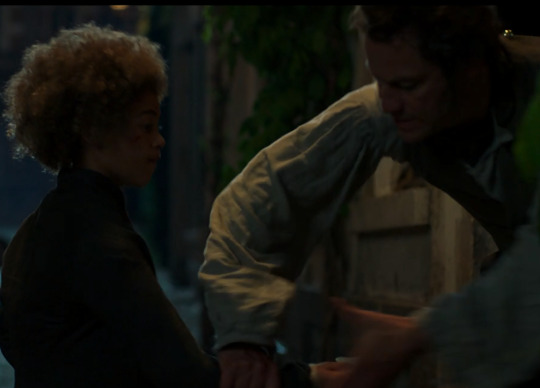
as Valjean JUMPS AT AND GRABS A CHILD and rips the note from his hand, and then growls at him to “hop it” until Gavroche does, in what is a really nasty echo of the Petit Gervais scene
and of course he reads Cosette’s letter and grabs a knife (WHO GAVE YOU A KNIFE), and heads to the barricade, where Javert lifts his head, alert, as his Valjean sense activates again.
...y’all I’m making as many jokes as I can but I am grieving for how horrible this Valjean is and how much more Cosette has to endure because of it?? this is grim. And while I know of course this series will stick to the plot of the book, it really would feel the most consistent for this Valjean to just flat out commit some good ol’ muderin’.
Well maybe JAVERT, SUPER POLICE PRESENCE will stop him! And save the poor barricade fighters from his malign influence! and then everyone can go get some cake with Cosette and Eponine and Mabeuf will make a Miraculous Recovery! That’s probably how it will go. No need to worry!
103 notes
·
View notes
Note
the term manpain is a sexist term used to degrade mens feelings as though they were lesser than womens feelings , “ They’re just trying to undermine the man’s feelings. There’s nothing wrong about a man wanting revenge from someone who hurt or killed his loved one. That’s a normal response. I’d act the same way. It isn’t sexist it’s just a way to tell a story” in a story some characters will die and it will effect another character its not sexist for a female characters death to effect a man

It’s absolutely sexist if it becomes a pervasive trend that encourages viewers to consistently think about women as two-dimensional, expendable objects that exist solely to further the man’s journey. Is a single story--or even a couple stories--about men who lost wives, daughters, girlfriends and who go on a rampage in response to that automatically a bad thing? Of course not. I’ve never claimed women should be “immune” to certain trends. (Although, like with Bury Your Gays, we reach a point where things have gotten so bad that it is very tempting to ban these options until writers start doing better...). The problem is we’ve developed entire genres around that exclusive setup. There’s a reason why you don’t see stories where men are horrifically murdered with the express purpose of setting up a woman-centric franchise (and when we do edge towards that territory people lose their shit about how “feminism is taking over.”) The double standard is staggering. Women can be brutalized, killed off, or not included at all and people don’t even blink because we’re so used to it. Women start to be included more---not even treating men like we’ve been treated on film, in comics, in books. Just included---and suddenly men are supposedly being persecuted as a result. Decency and something resembling equality is read as an attack. See: getting one Marvel movie with a woman lead and the backlash has been staggering. And Captain Marvel is white. Beautiful. Able-bodied. Never said to be queer on screen. God help us if we take the valid criticism at play---like the fact that Marvel has a trend of putting people of color in the sidekick role---and include a smidgen more diversity. What sort of backlash would we get then?
Uncle Ben and Obi Wan, the latter particularly, are full-fledged and beloved characters. Both got to live full lives before succumbing to the theme of heroes losing parental figures in order to fully come into themselves. Both are well known, well rounded, celebrated figures in comics and movies. Both had their own narrative journeys that were allowed to end satisfactorily, even if, yes, the ending includes death. That’s a far cry from the trend of fridging women in order to emphasize that 1. We’re disposable and 2. Perpetuating the idea that, as you yourself say, anon, going on a murderous rampage is supposedly a “normal response” to loss. That’s some messed up masculinity talking and your own examples prove that good storytelling doesn’t need to rely on it. Peter and Luke both become heroes after their loss, determined to embrace compassion and forgiveness. They didn’t pick up a semi-automatics and treat the audience to a spectacle of violence in which, once again, the women around them are killed, act as superfluous love interests, or apparently don’t exist in this world at all.
In short, though they’ve definitely got their issues when it comes to these topics (hey, Gwen Stacy) there’s a reason I still like Star Wars and Spiderman.
17 notes
·
View notes
Photo
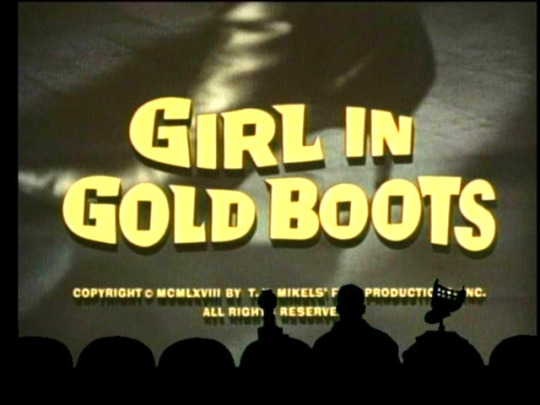
1002: The Girl in Gold Boots
Didn’t I just recently do a Ted V. Mikels movie as an Episode that Never Was? Yes, I did. That was the Corpse Grinders – I do actual episodes further in advance than the EtNWs, so it’s only been about a week since I watched it. Do I want to see another Ted V. Mikels movie? No, I don’t. Am I gonna do so anyway? Yes, I am, because I hate myself.
Fish-lipped Michele wants to be a dancer – and an opportunity to do so (and to escape her abusive and drunken father) walks into her life in the form of Buzz, whose sister Joanie is the star attraction at a sleazy LA nightclub called the Haunted House. After some misadventures that might be intended as comical but I really can’t tell, Michelle lands the job only to discover that the Haunted House is, of course, a Wretched Hive of Scum and Villainy. The club owner is selling drugs, all the dancers are junkies, the janitor’s a draft-dodger, and the band sucks.
Girl in Gold Boots is to Ted V. Mikels what Beast of Yucca Flats was to Coleman Francis. It’s a painfully bad movie that fails at almost everything, but it’s better than anything else he ever made.
The Astro-Zombies and The Corpse Grinders both began with apparently unrelated scenes and weird emphases that confused me far more than they intrigued me, and put me off the films that follow. The opening of Girl in Gold Boots is nice and straightforward: Michele is dancing to the jukebox when Buzz comes into the diner where she works, and he offers to make her a star. From there the story progresses in a very linear fashion, confirming our suspicions one by one. Buzz comes across as deeply untrustworthy, and sure enough he turns out to be the second ickiest elf I’ve seen doing this blog (Elves wasn’t that long ago, either). Critter the hitchhiker seems like there’s gotta be more to him than a wandering hairy beatnik, and yep, he’s on the run from the army. The Haunted House looks like it’s gotta be a front for something and it’s exactly that.
This means that nothing in Girl in Gold Boots is surprising to us – we saw all this coming from miles away, but the movie works. It tells a story that we understand, and the narrative never smacks us upside the head with anything so confusing or irrelevant that we stop and lose our place. That alone makes it better than anything else of Mikels’ that I’ve seen.
But man, it’s bad. It looks and sounds terrible – the music is not among the worst ever to disgrace our ears as MSTies, but it’s not great. The songs are okay while they’re actually playing but you forget them quickly. There are two different prints of the movie available, one of which has the weird skip in the footage which leads to Buzz teleporting back to the restaurant table – the other has similar skips in other places. The dancing and singing sequences are repetitive and dull.
Worse than that, Girl in Gold Boots breaks one of the biggest storytelling commandments: Thou Shalt Show, Not Tell. Other MST3K movies have done this, of course: Atlantic Rim told us about rather than showing us a ‘ship graveyard’. Teenagers from Outer Space told us rather than showed us that there was a fleet of spaceships about to land. Girl in Gold Boots does worse, because it tells us something that is directly contradicted by what we see. We’re told over and over that Michele’s dancing is an extraordinary talent, when the self-evident truth is:
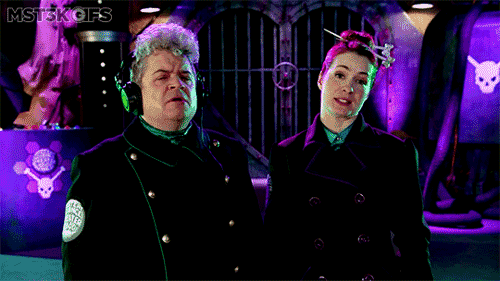
Actress Lesley McRay has some rhythm, but only barely. She’s better than most of the dancers in MUZ but only because she moves around rather than standing in one place. Mostly she just kind of sways back and forth and waves her arms languidly, like she’s at her first school dance and didn’t bring a date. In a way this helps her fit right in, since almost none of the dancers at the Haunted House is any better. They all appear to have been cast on the basis of having abs that would look good in a Sexy Baked Potato costume, actual talent secondary.
The closest thing to an accomplished dancer in the movie is Bara Byrnes, playing Joanie. She’s still not great, but the second time we see her dance, she manages to walk a very fine line of showing us that her drug abuse is interfering with her work while not actually being melodramatic about it. We can believe she’s gotten to this point while still being allowed to dance, but she’s right on the brink, and it’s no surprise that her boss decides to replace her.
Does this story have a moral? Sure does. It’s give up on your dreams, they aren’t worth it.
No, seriously. We’re following three main characters here: Michele is our primary protagonist, who dreams of stardom. She finds that the price of doing so is mixing with criminals, with Joanie for an example of where this path will lead her, and so she gives it up. Critter dreams of a peaceful, free-spirited lifestyle – the army is pretty much the exact opposite of that, but it is to the army he eventually goes. Buzz wants to be a wealthy drug dealer and have Michele all to himself, and that doesn’t work out for him, either. In the end Michele and Critter accept their own mediocrity while Buzz and Joanie are destroyed by their refusal to do the same.
Maybe that analysis is too cynical. Maybe this is actually supposed to be a story about avoiding shortcuts. Everybody here wanted a shortcut to their dreams. Michele seizes upon a suspicious offer because she thinks it’s all she’ll ever get. Critter runs away because he can’t stand the idea of soldiering (excuse me) through. Buzz kills a man in his attempt to climb the ladder. In each case, it’s this attempt at a shortcut that brings them down, ushering Michele into the world of drugs, forcing Critter to find a hole to hide in, etcetera. Maybe in the end, Michele and Critter have learned not that their dreams aren’t worth it, but that there are no shortcuts – in order to get to the top, you have to climb the hill.
And yet that’s not what we see. The ending scene, with the happy couple partying all alone on a beach, seems to suggest that this is it: Critter will go off to war and Michele will sit and wait for him while living off his soldier’s paycheques. The idea of what they will do after his service is completed never comes up. There is no hint that Michele will continue to pursue a career in dance through other avenues. They both just settle for being average.
This is realistic, I guess… you guys have heard the story about how I wanted to be an archaeologist until I accidentally broke an ancient skull open with my trowel when I mistook it for a rock. I’m happy enough in my current career, but that’s not what fiction is for. If I’m watching a movie about somebody chasing a dream, I want to see it end with at least the hope of achieving it!
Maybe Michele has decided that dancing was just an excuse, and what she really wanted was to escape her father, but after she leaves the diner that is never mentioned again. The father was just a plot device, something needed to make going with the obviously slimy Buzz seem like a good idea in comparison.
Respect for women is a fairly major motif in this movie, which raises a few eyebrows when the camera spends so much time looking down their bras and up their skirts. The bad guys in this movie are the ones who treat women poorly. Michele’s father shouts at and hits her. Buzz manipulates her and drags her into a world of crime. The owner of the Haunted House drugs her and also abuses Joanie, his own girlfriend. When Buzz is posing as an inmate his supposed crime is domestic violence.
We’re supposed to contrast this with Critter, who loves and respects Michele. When he begs her to leave the club, she tells him that if he says he loves her, she’ll elope with him – but he refuses to do so because he has his own crimes to run from and doesn’t want her involved in those. Michele should want to escape for her own sake, not for anybody else’s, and he would rather break her heart than get her in more trouble. At the end, when he has joined the army after all, I think we’re supposed to assume that he did it so that she can be secure, rather than Tom Servo’s analysis that he’s learned he enjoys violence and is ready to kill like a man oughtta.
This is emphasized enough that I’m pretty sure it’s intentional, and while the sentiment is admirable, in a film like Girl in Gold Boots it reeks of hypocrisy. We cannot respect Michele while also drooling over her in a fur-trimmed bikini. Maybe we’re meant to view Michele giving up dancing as a form of self-respect, not letting herself be degraded anymore. But what about the other dancers? Does Joanie deserve to be treated as a sex object because she’s an addict? We never get to know the backup dancers, but should we assume they’ve all committed similar sins? As with Hollywood After Dark, the movie seems to suggest that virtuous women should be treated with respect, but sluts are deserving targets. No. That is not how it works.
I didn’t really remember this episode, so when I watched it again in preparation for this review, I was surprised by how funny it was. The riffs are top-notch and the host sketches are pretty good, too – my favourite is the bit where Pearl starts just wailing on Brain Guy with the film canister while the guy from the Mad Science Certification Board nods approvingly. Paul’s giggling really sells it.
48 notes
·
View notes
Text
See You Again - Loki Laufeyson x Reader


Imagine seeing Loki again after believing him to be dead - again (Second Version)
Notes: I think I did a similar imagine before but I finally watched Thor: Ragnarok and my muse came by to say hello. Not to mention that movie being my favourite from the trilogy because it has so much Loki in it, I could barely see straight.
Warning: Language, angst (like always, lol!), oh, and violence
Words: 955
Buy me a cuppa | Read my published books
She still couldn’t believe it. He was alive, Loki was alive. After nearly a year of mourning him, shedding tears for a corpse which was ultimately a sham - again - made her angry all over. Who’d have thought that this trickster could still invoke such powerful emotions in her again?
She had given him the silent treatment - ever since the reveal in Asgard and Sakaar - knowing that she wouldn’t resort to such petty actions like Thor was when he kept throwing objects at his brother’s face.

It was quite a beautiful face but ... no! - she wouldn’t let herself be swayed by his good looks and suave charm.
If anything, she was going to save the Asgardians, do her thing and then she would never have to see his smirking face ever again.
If only she wouldn’t have to spend unnecessary time with him in an elevator but it was already a pretty enclosed space and this was just torture.
“What? No hurtful words? Nothing to throw at me? I would have thought that after not seeing each other in nearly a year, you would give your husband more than just the silent treatment.” Loki gazed at her features, hoping to elicit a reaction from her.
She tilted her head in mock thought. “No, I don’t think so. I got nothing to say. If anything, I’m going to make sure I will never have to see your lying face ever again.” The sweet smile only enhanced her wanting to make him feel like he was nothing - just like he seemed to want to make her feel when he faked his death - again.

Only hearing her using this voice on their enemies, Loki never would have thought that his beloved would ever use the saccharine one on him.
He gave her a flustered grin, hoping to appease her and wanting to get back in (Y/N)’s good graces. “Look, my love...”
As the doors of the elevator opened, she nearly fled from his reach.
Thor was waiting for them on the other side, who could basically feel the tension and alternated gazing between them like he was expecting a bomb to go off.
“Everything alright in here?”
Loki remained quiet, clenching his jaw.
“Let’s just get this over with.”
She would never have thought to be fighting alongside Loki again, side by side. Or more like back to back.

“You’re fighting as viciously and splendidly as I remember, love.” Loki sent his wife a charming smile and clenched his teeth when didn’t get a response.
Loki breathed in deeply. “Why don’t we continue our conversation which was cut short by the oh so timed entrance of my great brother, Thor?”
Her head whipped around, knocking two of Hela’s henchmen flying to the ground. “Now?! You want to talk about this now? When we’re busy fighting off the apocalypse?”
“Well, I seem to remember that you can’t run from me while we’re in battle."

“Besides, when else are we going to talk about it?”
“Uh, how about never? Just like you did when you didn’t mention you were faking your death to impersonate Odin and take over the throne to become king?” She used her anger to throat-punch her enemy and knock him unconscious by transferring her golden energy into one of her iron batons.
“I was trying to keep you from harm’s way,” Loki exclaimed, emphasizing his point by pushing her behind him and brandishing his dagger through a foe’s helmet.
She pulled Loki towards her so she could look him in his green eyes. “Yeah, sure. You’re a fucking coward, that’s what you are,” she whispered in his face, noticing how nothing else existed but him. Not the war around them and certainly not Hela coming their way. “You only care about yourself, Loki.”
Loki’s features twisted in pain. “Don’t you trust me?”
“Hell, no. I mean, how could I? You betrayed us in Sakaar, again, to save your own skin.”
“No, I’d never - that wasn’t...” His head turned, glaring at Hela.
Loki licked his lips, distracting her for a moment. “To be continued.”
She rolled her eyes, already dreading all the interruptions.
(Y/N) was roused from her sleep when she felt a blanket being draped over her form. As her eyes opened, she noticed several things. First, she was still in the huge and spacious aircraft in which the people of Asgard were rescued in. The one in which Loki had decided to paint himself as the great saviour of the people.
And second, it was Loki covering up her body with much-needed warmth. She gazed into his eyes, noticing how he pressed his lips together, looking like he was caught red-handed.

“What are you doing?” She asked with a croaking voice, blinking slightly.
Loki cleared his throat. “I ... uh ...”
Her lips twitched at his ability to speak so eloquently. “What happened to the infamous silver tongue?”
Loki couldn’t suppress the fond smile forming on his face as he turned his head away. “Well, we both know my special powers never worked on you.” his thoughts seemed to go elsewhere. “By the Gods, I missed you,” he whispered, his face contorting into a pained grimace.
She felt herself soften, getting tired of all this anger and bitterness inside her. With hesitation she weaved her fingers through his shoulder-length raven hair, massaging his scalp (like she always used to do after a long day). Loki groaned, rubbing his head against her hand.
He opened his eyes again, displaying sad green orbs. “I’m sorry. And I promise to tell you next time I do fake my own death again.”
Her lips twitched at that. “It’s a start, I guess.”
#steph writes#thor ragnarok#thor ragnarok imagine#thor ragnarok imagines#loki imagine#loki imagines#loki x oc#loki x reader#loki laufeyson#loki laufeyson imagine#loki laufeyson imagines#loki laufeyson x oc#loki laufeyson x reader#loki laufeyson x you#tom hiddleston#tom hiddleston imagine#tom hiddleston imagines#marvel#marvel imagine#marvel imagines
740 notes
·
View notes
Text
Avengers: Endgame - final thoughts
So, I saw Avengers: Endgame for the second time on July 1. And ever since then, I’ve been meaning to post my full review. You might be wondering, what took so long? Well, I had a review all ready the night I came back from the theater, but Tumblr ate it, and it took a while for me to regain the motivation to type it up again. And then I wanted to make sure it was a really good, super-detailed review, so it took even longer. End result being that it’s now two months later later, so who knows if anyone even cares anymore ;) But I’m sharing it anyway, so it doesn’t feel like a complete waste of time.
(Keep in mind this review was largely written before Spider-Man: Far From Home and the SDCC came around to muddy the waters, so nothing past Endgame is mentioned.)
I think I actually liked this movie better the second time I saw it. I enjoyed it the first time, certainly, but the first time I was so concerned about what the movie might be like, what might happen next, who would live or die, how the whole saga would be concluded, that I wasn’t fully able to be in the moment. And when you go into a movie with that attitude, and with a wishlist of things you want to see, it’s easy to feel slightly disappointed when an item doesn’t get checked off your list.
But when I saw Endgame the second time, I already knew what was going to happen, so I was able to relax more and just appreciate everything – the action, the humor, the music, the characters, everything. To quote Thor, I was able to appreciate the movie for what it was, not for what it was “supposed” to be.
One thing I especially appreciated this time was the sheer variety the movie presented, in the tone, the characters, and the settings. Both Infinity War and Endgame are long movies that feel much shorter, but they achieve that in different ways. Infinity War was near non-stop action and dramatic reversals, so you never had time to get bored. In contrast, Endgame has a lot more quiet moments and mundane interactions. It’s almost like a mini-series of half-hour episodes, each with its own tone and setting.
I really like how Endgame opens, with something as simple as Clint spending time with his family. It really cut me when he looked away for a moment and all his family disappeared. The opening emphasizes that, however long it may have been for the audience since seeing Infinity War, for the characters it’s a fresh tragedy. The “Porch” musical theme from the end of Infinity War shows up here too, linking the two movies together (it’d be amazing to watch them back-to-back sometime).
The somber mood continues with Tony out in space, desperately trying to get home. When he finally does, he’s relieved to find Pepper still alive, but that doesn’t make everything better (and of course, he hasn’t exactly forgiven Steve yet either). With the help of Nebula and Captain Marvel, a group goes to hunt down Thanos, hoping they can use the Stones themselves to bring back the Snapped. But of course, Thanos has already destroyed the Stones, and there’s no getting them back, ever.
When Thor chopped off Thanos’s head mid-sentence, it was very satisfying, but of course that didn’t actually fix anything – even Thor realizes this within five seconds. This whole section of the movie is like a delayed climax from Infinity War, and has an even greater sense of finality and failure than the dusting itself.
When I first saw the words “Five…Years…Later” appear on screen, I was really startled. That the writers would let this world and the Avengers spend five years wallowing in their failure. It probably shouldn’t be surprising that most of them stepped down from hero business in the interim. Out of everyone, I actually think Bruce handled the post-apocalypse the best, finally able to achieve self-acceptance and inner peace. On the flip side is Thor, who seems to feel the most personally responsible for the tragedy – if only he had gone for the head the first time! – and who spends every day drinking himself senseless so he doesn’t have to think about it. Tony seems content to hide out in his lake cabin with his wife and daughter, not getting involved in the problems of the larger world. Natasha buries herself in work, and Steve seems to just drift aimlessly. And Clint…His despair sends him into darkness and violence, and I wonder if his previous crimes when he was being mind-controlled made it the tiniest bit easier to fall into that darkness.
If you look at the “going after Thanos in the garden” part as a prologue, then the whole “living with failure” is the start of the first act. Everyone is just trying to make do, carry on the best way they know how. This part of the movie is very subdued, almost mundane, and mostly consists of characters exchanging dialogue, absent of action, of music, of life. But the whole of the MCU has done so much work in developing these characters that even just watching them interact is interesting. They no longer feel like actors, just people playing off each other in the most natural way. They feel like old friends, both to each other and the audience, friends who are going through a tough time.
The inciting incident, the moment things start to change, is when Ant-Man arrives. He’s the one who brings hope and humor back into the movie. He hasn’t had to live through years in this ruined world, so he still has optimism that they can fix things. You know, when he first suggested time travel, I was a bit nervous since a lot of movies don’t handle time travel very well. But the “time heist”, as it’s called, may be my favorite part of the movie.
So we move into the second act, where the Avengers split up and go after the Infinity Stones in different time periods. This section is a lot more “fun” than the previous scenes, as the characters re-visit moments from past movies, making the heist into a sort of “MCU in Review”. But these scenes aren’t just cut-and-pasted from their original movies – instead we get to look at them from different angles, see what was happening just offscreen, and see characters who wouldn’t even make their first appearance until later, like seeing the Ancient One and Brock Rumlow during the Battle in New York.
With multiple time-travel groups, the movie cuts quickly between them, so you’re never quite sure where or when you’ll get to see next. Again, the sheer number of characters in this movie is amazing – nearly everyone from Infinity War, plus time travel allows even more characters to show up. Sure, many appearances are just cameos, but the level of logistical planning that all these scenes must’ve involved just boggles the mind.
Not only does the time travel let viewers revisit parts of the MCU, it also allows the main three Avengers (Tony, Steve, and Thor) to reach some closure with their past. Tony and Thor get to have proper goodbyes with their parents; Steve’s closure has to wait until the end of the movie, but is worth the wait.
The time heist is mostly just fun at first, but slowly things start to go wrong. First Natasha dies, then Nebula is captured and replaced by her own past self, who finds a way to bring the nightmare of Thanos back into everyone’s lives. To be honest I wasn’t sure if or how he would be relevant to the movie again after being killed right at the start, so this twist really caught me off-guard. The moment Thanos’s ship opens fire and destroys the Avengers Compound is one of the most startling in the movie, jolting events right into the third act.
The final battle is very complex and would take a long time to properly break down. Seeing Thanos’s army of Leviathans, Outriders, the Black Order, and more as a single unified force – it’s almost as exciting as seeing the heroes all assembled. The moment where all the dusted heroes show up on the battlefield, to the “Portals” theme, may be the most emotionally stirring moment in the series. The power level on each side is unfathomable; and when it all ends and the bad guys fade away into dust – first the legion, and then finally, finally Thanos himself – I felt a real vindictive satisfaction that he got what he deserved, that this time it was the Avengers who had the last laugh.
I know some people were angry about how Tony Stark died, but really, what better end for a character can you ask for? He saved the whole universe, and had a grand funeral with many attendees – many of whom didn’t even like him personally, but recognized the debt they owe him. The part at the end where Happy is trying to comfort Tony’s cute daughter, who is too young to completely understand what’s going on…Priceless. In the very first Iron Man movie, Yinsen told Tony “Don’t waste your life”, and I think he’d be proud.
The first time I saw Endgame, I wasn’t sure how I felt about Steve and Thor’s endings, but on a second viewing I felt much better about them. Steve, after all his sacrifice, living the superhero life non-stop, finally got to have the life he wanted with Peggy. Thor wasn’t able to get back any of the friends or family he lost, but he finally got over his guilt and depression, and left with the Guardians to have a new adventure. I think they will all get along well ;)
[another thing that made this second viewing fun – I sat next to a family who was seeing it for the first time, and the kids were very animated in their reactions to all the big moments, action, and jokes, so that made it more special for me too. I love seeing other people react to something I already know and enjoy.]
Addendum:
Like I said, all of the above was written several months ago, and I haven’t yet seen Spider-Man: Far From Home and have generally not looked into any Marvel news since then. Truth is, I’m extremely nervous about the future of the MCU. I know the studio can’t rest on their laurels, and so have to keep making movies, but personally I’d be happy if the MCU was truly done with Endgame. Not that I think everything after that will be junk, but because Endgame provided such a satisfying conclusion that I’m afraid future entries will just confuse things, or reduce that sense of closure. “Stop when things are at their best,” is what I believe. Otherwise you risk undoing the specialness of the story by repeating yourself, making accidental (or deliberate) retcons, or by losing the thread of a character’s arc and treating them more as a marketable commodity than a person.
But! I have a strategy prepared – if future entries after the Infinity Saga don’t capture that same wonder, don’t spark the same interest in me, I’m prepared to view them as expensive fanfiction, and be satisfied with the perfect, complete story that Marvel already gave us :)
1 note
·
View note
Text
Disney Princesses as Strong Women: Pocahontas’s Power to Choose Her Path
That one Disney Princess movie without a happy ending.
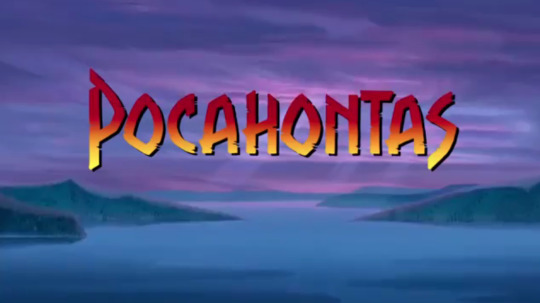
As per my requisite disclaimer, there is absolutely room for (a lot of) legitimate criticism of Pocahontas, especially around its portrayal of culture, history, and race, and this is not going to invalidate any valid criticism of the film or of Pocahontas, but rather offer a different perspective on her film and specifically on Pocahontas as a Disney character in the Disney film, not as a real person.
Out of all the Disney films, though, I do want to add an extra disclaimer for Pocahontas. It has a lot of cringe-worthy and outright inaccurate and offensive racial portrayals. The song “Savages” in addition to having extremely racist terms used in it, equates Native Americans with the colonists, and while the message of the song would make sense in the Romeo and Juliet situation the film portrays it as, it does not work in the context of a real historical issue where there was a clear aggressively racist, genocidal, and plain morally wrong side (the colonists), especially when the oppression of Native Americans is still very much a thing. However, I want to focus this meta on Pocahontas’s fictional character within the film, because I think there’s a lot to like in terms of who she is. That being said, divorcing from context is hard, so there’s a tension there. If anything I say is insensitive, please let me know.
So Pocahontas opens with the colonizers setting sail from England with the song “Virginia Company,” which includes the lyrics:
For the New World is like heaven
And we'll all be rich and free
Or so we have been told
By the Virginia Company
So we have been told by the Virginia Company
The emphasis on “so we have been told” sets up one of the themes Pocahontas’s character exemplifies: the idea of choosing your path versus following lies and promises given by people who are probably motivated by their own selfish desires (Governor Radcliffe). The riches the song describes are, of course, not there, but the colonists follow the hope of it and wind up missing the forest for the trees. Essentially, Pocahontas encourages critical thinking and moving one’s concerns from just one’s own life to one’s place in the world.
The beginning also sets up John Smith as a foil to Pocahontas. From the very beginning, he’s fundamentally concerned about himself, constantly talking about his wants and adventures. In the song, “Mine,” which emphasizes the greed of the colonists, Smith, who has no interest in gold, chimes in “hundreds of dangers await/And I don’t plan to miss one!” He’s only thinking about his own desire for the next thrill, telling the other colonists that he’s “been to dozens of new worlds” and doubts this one will be unique, and comments that he expects the Native Americans to be basically the same as other people: “If they’re anything like the [people] I’ve fought before...” His perspective is entirely centered on himself: he views adventures and new lands and other people also as things for himself, instead of seeing himself as part of a whole world.
Pocahontas is a bit different, but she also struggles to learn responsibility throughout the film. It’s noted to Powhatan in his introduction (when he asks where his daughter is) that she “takes after her mother” and “goes wherever the wind takes her.” Cut to Pocahontas and Nakoma (a good friend, this movie miiiiight pass the Bechdel test? It’s kinda borderline), and Pocahontas jumps off a cliff. However, Meeko jumps after her and is terrified, symbolically warning that even though her freedom is not the selfishness of John Smith, her choices still affect others both positively and negatively at times as well, as we’ll see them affecting her father, Kocoum, Nakoma, and more.

Powhatan tells her "you are the daughter of the chief. It is time for you to take your place among the people," and gives her the necklace that belonged to her mother. Pocahontas is often compared to her mother: the first two scenes I mentioned, and Grandmother Willow also tells Pocahontas her mother once asked her the same question about what path to take in life. There is perhaps the suggestion that people are expecting Pocahontas to take her mother’s path, but as Grandmother Willow encourages, she has her own choices to make.
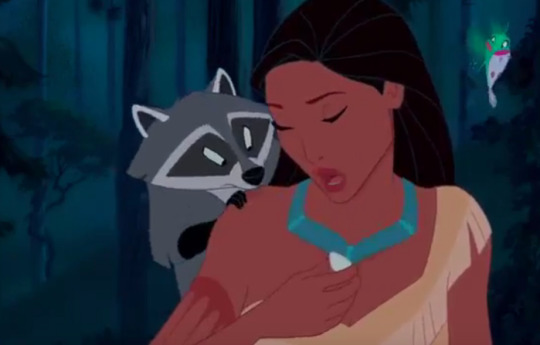
The answer, after all, as Grandmother Willow says, is to “listen.” Empathy and learning are paths to being able to make wise decisions, after all. This will be emphasized later when she begs her father to “try talking to [the colonists]” instead of resorting to war. Towards the climax of the film, Smith comments that the colonists won’t want to listen to reason because "everything about this land has them spooked." A creepy figure then appears, howling as if to emphasize his words--but it turns out to be Percy, Radcliffe’s dog, symbolizing that what’s really spooking the colonists is themselves.
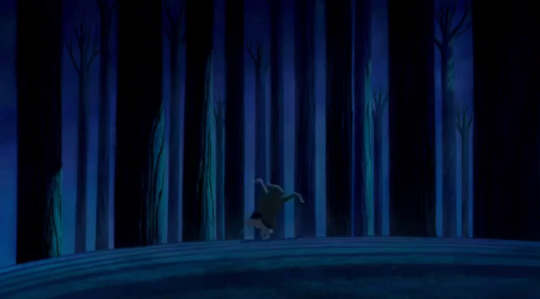
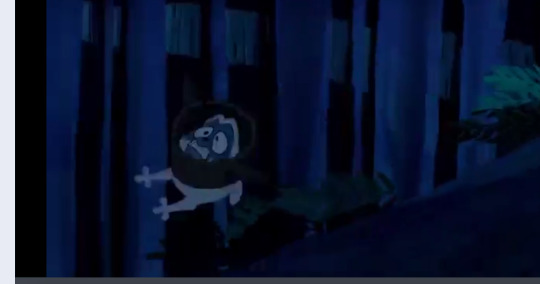
When Smith and Pocahontas meet, he almost shoots her, and then falls in love with her, which is the story calling him out on the violence he previously bragged about.
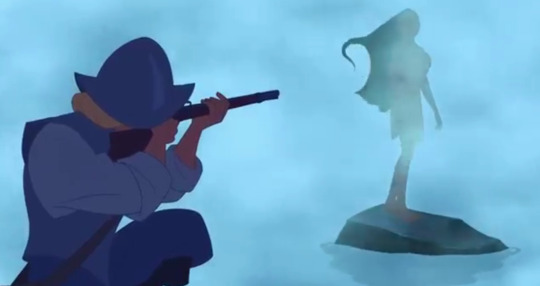
When she runs, he tries to stop her from leaving by forcing her to stay via grabbing her canoe.
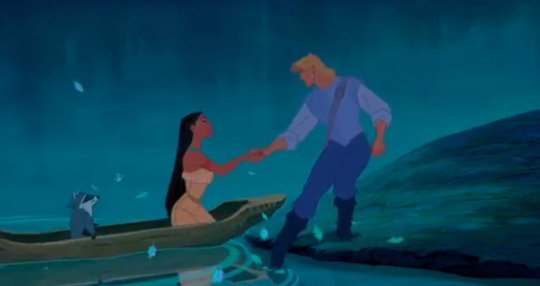
But Pocahontas is not having that. He tries to speak to her in English and they realize they can’t understand each other, so he offers her his hand--symbolic of listening. Notably after this the language issue goes away which again, don’t think too hard about it it’s a children’s story, but symbolically it seems to represent the idea that once they’re listening to each other, they can understand each other.
When Smith goes all White Savior on Pocahontas, claiming that “we'll show your people how to use this land properly... build houses” and Pocahontas points out their houses are just fine, he patronizing counters “you think that your houses are fine only because you don't know any better." And she leaves. Pocahontas is not here for your racist patronization instead of listening to her. They then launch into “Colors of the Wind,” with its fitting lyrics about how they all have a place in the world, but it’s essentially not all about them and encourages respect for “every rock and tree and creature.” You desires matter, but so do other people’s.
When she says she has to go because she can hear the drums signifying that her people are in trouble, the exact same scene as their first meeting plays out, except this time he lets her leave instead of trying to stop her. He lets her make her own choices.
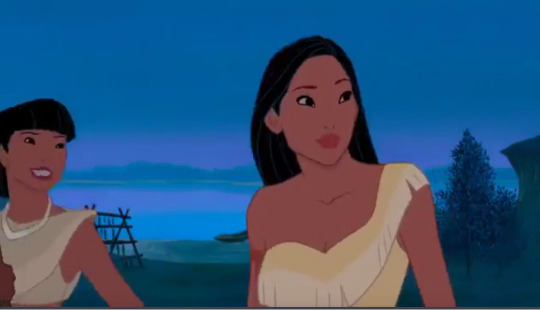
When Pocahontas starts spending more and more time with John Smith, Kocoum warns Nakoma “tell her not to run of... she listens to you.” In response Nakoma snorts and says, “Sure she does,” because well, Pocahontas doesn’t, and she doesn’t tell her best friend what’s going on until it’s too late. This leads to tragedy when Nakoma tries to help her by sending Kocoum to help her because she worries for her friend’s safety, and Kocoum is killed. As he dies, he tears Pocahontas’s necklace from her neck, symbolically threatening to tear her connection with her mother’s free path.
And yet John Smith is unquestionably the one more at fault for bringing about the tragedy. Radcliffe tells an impressionable Thomas that “a man's not a man unless he learns how to shoot.” Oh hey white America hasn’t changed at all.
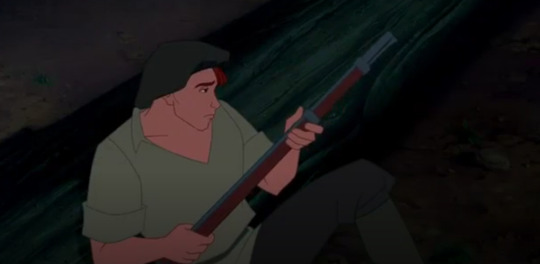
Smith then gives him advice, teaching him how to shoot from his presumably many experiences shooting...
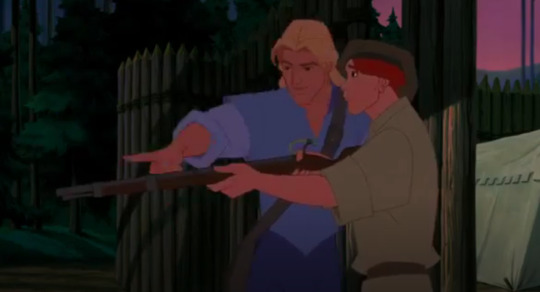
...but Thomas then uses the gun to save Smith but kill Kocoum.
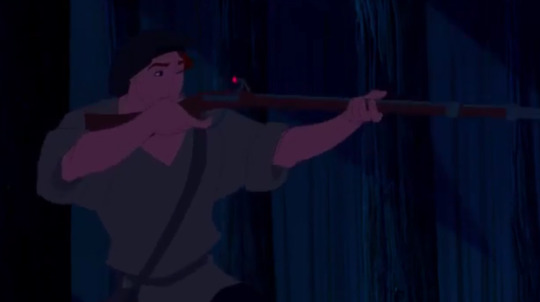
Smith then takes the blame for Thomas, sacrificing himself for a kid who’s really naive and was only trying to follow in the footsteps of Smith, his idol. And Pocahontas then throws herself onto Smith, protecting him at the risk of her own life as well. As she runs to save him, she sings “I don’t t know what I can do/Still i know I've got to try" jumping over a gap between two rocks because symbolism.
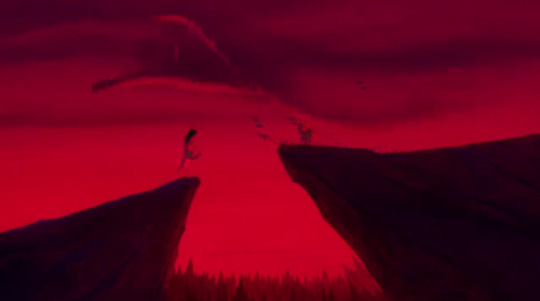
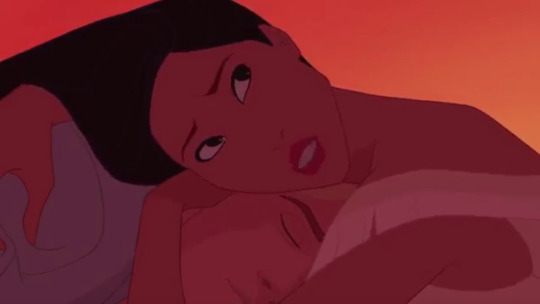
This shows Pocahontas growing, taking responsibility for what is about to happen to Smith. They stop the war, but Smith is shot because he again realizes that he should take responsibility because he’s the one who came here in the first place (and the... smokescreen... reason the colonists were marching on them) and jumps in front of Powhatan to save him.
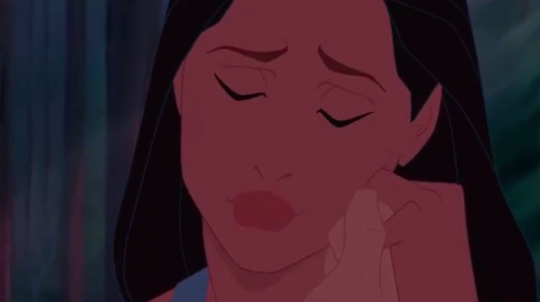
He asks Pocahontas to return with him. Her father gives her his blessing to do so. But she turns him down, though she loves him, because she says, “my place is with my people.” But instead of having her path written for her, she has made her own choice, and she made it by listening. It was time she take her place among her people, but she needed to define that place herself, and listen to the world around her to arrive there, instead of simply acquiescing.
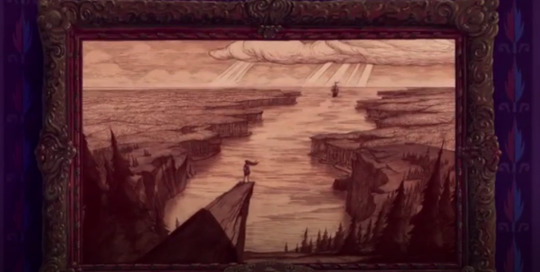
And so he leaves and cue a tragic ending, but for the children. But Pocahontas’s character has a lot of power and emphasis on growing up and what that entails: learning, listening, guidance, making mistakes and growing from them. I really like her character a lot, and it’s certainly one of the more thematically... realistic as opposed to optimistic Disney films.
Up next, one of my favorites: Esmeralda! Yes I know she isn’t technically a princess but to quote the Genie from Aladdin, she’s a prince[ss] to me, so I’m writing about her :P For previous entries in this series, see here:
Snow White’s Self-Esteem
Cinderella’s Courage and Compassion
Aurora’s Autonomy
Ariel’s Adventurous Spirit
Belle’s Bravery (and Boundaries)
Jasmine’s Justice
36 notes
·
View notes